







By David Rullo | Senior Sta Writer


The Jewish Association on Aging announced plans to create a new urban senior village at its Browns Hill Road campus.
Construction will begin soon on the first phase of the renovations that will transform the former Charles Morris Nursing and Rehabilitation Center into 30 personal care residences and add new executive offices, a renovated kitchen and cosmetic updates to the AHAVA Memory Care Residence, according to JAA Board Chair Lou Plung.
Work is projected to be completed in
A second phase will create an independent living facility, consisting of approximately 60 units, on the site of the former Residence at Weinberg Village.
Once the new urban senior village is finished, the campus — including The New Riverview — will boast 311 living units. Its accommodations and services will encompass independent living, personal care, memory care and wraparound services such as home health, hospice, Mollie’s Meals, physical therapy and care navigation. Residents, Plung said, will be able to move through the system as their needs and level of care change.

Once the construction is finished, he said, an evaluation process will begin to determine what, if any, additional amenities should be added.
“What we hope to do is step back and say, ‘OK, what more can we put on the campus that will benefit the entire campus, that everyone is going to want to use and partake of? Is that some kind of JCC? Is it a medical building? Is it shopping?’” he said.
The opportunities are plentiful, Plung said, and will present themselves once the main campus is completed.
“Our focus right now is getting the infrastructure built, getting the residents on campus and then getting it to become a community,” he said.
JAA is partnering with Continental Real Estate but will retain ownership of the property and buildings.
Continental, based in Ohio, is a nationwide developer and builder of commercial real estate projects. It has a large portfolio in Pittsburgh, including developments at The Waterfront, the North Shore and the Galleria of Mt. Lebanon, as well as senior communities in three states, including Apple Blossom in Moon Township, Pennsylvania.

By Adam Reinherz | Senior Sta Writer
The Jewish Federation of Greater Pittsburgh marked a “difficult” 12-month stretch during its 2024 annual meeting. Speaking before nearly 150 community members at the Jewish Community Center of Greater Pittsburgh on Sept. 11, Federation volunteers and staff recounted a period marked by increased antisemitism, conclusion of the Pittsburgh synagogue shooting trial and lingering effects of Israel’s ongoing war with Hamas.
“Despite the immense damage, both mental and physical in Israel and in Jewish Pittsburgh, we continue to remain a resilient community,” Federation’s Chairman of the Board Jan Levinson said. “We stay true to our values and respond to strength, unity and unwavering resolve. That’s why resilience has become our hallmark, and what Jewish Pittsburgh is known for.”
“It was a difficult year, emotionally with the horrifying attack of Oct. 7 and its
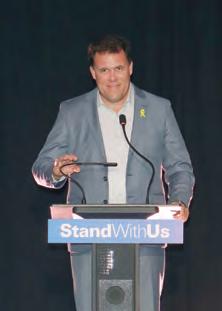

By David Rullo | Senior Sta Writer
More than 300 members of Pittsburgh’s Jewish community, politicians, local leaders, interfaith supporters and students attended StandWithUs’ inaugural Pittsburgh reception, held Sept. 13 at Rodef Shalom Congregation.
The event honored Pittsburgh City Controller Rachael Heisler and Ilay Dvir, and featured keynote speaker Jonathan Conricus. (see interview on Page 7).
Board Chair Charlene Tissenbaum opened the event by acknowledging the role of the organization’s Mid-Atlantic director and Squirrel Hill resident Julie Paris.
“A rock star, powerhouse, pillar of our pro-Jewish, pro-Israel, pro-Zionist community, even before you brought StandWithUs to Pittsburgh, you have always been one of Pittsburgh’s Israel people—strong, independent, articulate, passionate and brave,” Tissenbaum said.
Tissenbaum added that StandWithUs and Paris have unified Pittsburgh’s Jewish community.
After Tissenbaum’s introduction, a video highlighted the work of StandWithUs, both across the country and around the world.
Founded in 2001, StandWithUs is an international, non-partisan educational organization that supports Israel and fights antisemitism.
In addition to hosting rallies in support of Israel, holding educational conferences, working with government officials, booking speakers, creating robust social media posts, providing pro-bono legal assistance to defend students, faculty and community members against antisemitic discrimination and creating classroom programs, StandWithUs

also founded the Emerson Fellowship — a program that empowers the next generation of Jewish leaders — as well as both the Kenneth Leventhal High School Internship and the Teen Leadership Council.
After attendees learned more about the work of StandWithUs, Julie Paris took the stage and gave an overview of the work the organization did in Pittsburgh this past year, emphasizing its endeavors since Oct. 7.
“Our priority was to bring our community together to show public support for Israel and to stand against Hamas terror,” Paris said. StandWithUs did this, she said, by working with local partners to organize and publicize rallies, fundraisers and exhibits, and reaching out to local media to get Israel’s story told.
An important part of StandWithUs’ focus, she said, has been the local vigils like the “Bring Them Home” rallies held in Squirrel Hill regularly.
And, she said, the nonprofit has stood with college students, making sure they feel supported despite anti-Zionist protests on campus and bullying by anti-Zionist professors.
At the high school level, StandWithUs worked with Pittsburgh Public Schools to expose antisemitic and anti-Israel bias
The organization, Paris said, has also built partnerships with interfaith allies, including those in the Hindu and Christian communities. StandWithUs is often the first to respond to antisemitic incidents in Jewish communities because of its dedicated research team, Paris added, noting that they have sent more than 150 letters to municipalities in the Mid-Atlantic region about the dangers of cease-fire resolutions and the boycott, divest and sanctions movement.
“Our strength is in our unity,” Paris said. “We are committed to working collaboratively whenever possible with organizations that share our mission and vision.”
She made special note of the recent attack on two University of Pittsburgh Jewish students by a man wearing a keffiyeh.
The Shalom Award honoree, City Controller Rachael Heisler, has been a “great friend to the Jewish community,” Paris said, and often uses her platform and voice to fight antisemitism.
Heisler, Paris noted, was the only elected official to act against an attempted BDS referendum in the City of Pittsburgh, something StandWithUs, the Jewish Federation of Greater Pittsburgh and a substantial group of volunteers helped to defeat.

SUBSCRIPTIONS
subscriptions@pittsburghjewishchronicle.org 412-687-1000, ext. 2
TO ADVERTISE advertising@pittsburghjewishchronicle.org 412-687-1000, ext. 1
EDITORIAL DEPARTMENT
Email: newsdesk@pittsburghjewishchronicle.org
BOARD OF TRUSTEES
Evan H. Stein, Board Chair
Derek Smith, Treasurer
Gayle R. Kraut, Secretary
Evan Indianer, Immediate Past Chair
Gail Childs, Dan Droz, Malke Steinfeld Frank, Seth Glick, Tammy Hepps, Judith Kanal, Cátia Kossovsky, Charles Saul
GENERAL COUNSEL
Stuart R. Kaplan, Esq.
Jim Busis, CEO and Publisher 412-228-4690 jbusis@pittsburghjewishchronicle.org
EDITORIAL Toby Tabachnick, Editor 412-228-4577 ttabachnick@pittsburghjewishchronicle.org
Jarrad Saffren, Contributing Editor
Adam Reinherz, Senior Staff Writer 412-687-1000 areinherz@pittsburghjewishchronicle.org
David Rullo, Senior Staff Writer 412-687-1000 drullo@pittsburghjewishchronicle.org
ADVERTISING
Amy Weiss, Account Executive (412) 613-0697 aweiss@pittsburghjewishchronicle.org
“She faced tremendous backlash for her decision but never wavered, always saying that she was committed to doing the right thing,” Paris said of Heisler.
Accepting the award, Heisler, who is not Jewish, spoke of her deep connections to the Jewish community, including her time attending Hillel events while in college.
“Since Oct. 7, people have been very gracious calling me brave,” she said. “I don’t feel brave. I feel like I’m doing the right thing.”
Noting that throughout her life, many of her friends have been Jewish, Heisler called the unprecedented hate facing the Jewish community “unacceptable.”
“I will be using my voice to stand up against antisemitism, against racism, against LGBT hate and Islamophobia,” she said. “Right now, we’re seeing Jewish hate, and I believe calling it out for what it is and using that word, ‘antisemitism,’ is important. I want to reiterate my loyalty to you and to speaking out against hate wherever I find it.”
Honoring Ilay Dvir, Dimas Guaico, StandWithUs’ senior campus regional manager for the Mid-Atlantic region, said the Squirrel Hill resident was a “beacon of light and hope” for the community, and highlighted Dvir’s work to help lead the “Bring Them Home” rallies.
“There’s so much more I can say about Ilay’s dedication and leadership, his commitment and passion has been nothing short of inspiring,” Guaico said.
A small crowd of mostly masked protesters stood outside the event with signs taking aim at StandWithUs, the IDF and the fact that the reception was held in a synagogue. One sign, held by a protester who used it as a shield to hide his face, attacked Heisler: “Rachel, quit doin Jewface.” PJC
David Rullo can be reached at drullo@ pittsburghjewishchronicle.org.
Main phone number: 412-687-1000 Subscriptions: 412-687-1000, ext. 2
PRODUCTION
Jeni Mann Tough Production Manager
Carl Weigel
Art/Production Coordinator
Subscriptions subscriptions@pittsburghjewishchronicle.org 412-687-1000, ext. 2
Published every Friday by the Pittsburgh Jewish Publication and Education Foundation 5915 Beacon St., 5th Floor Pittsburgh, PA 15217
Phone: 412-687-1000
POSTMASTER:
Send address change to PITTSBURGH JEWISH CHRONICLE, 5915 BEACON ST., 5TH FLOOR PITTSBURGH, PA 15217
(PERIODICAL RATE POSTAGE PAID AT PITTSBURGH, PA, AND AT ADDITIONAL MAILING OFFICES) USPS 582-740

Manuscripts, letters, documents and photographs sent to the Pittsburgh Jewish Chronicle become the property of this publication, which is not responsible for the return or loss of such items.
The Pittsburgh Jewish Chronicle does not endorse the goods or services advertised or covered in its pages and makes no representation to the kashrut of food products and services in said advertising or articles. The publisher is not liable for damages if, for any reason whatsoever, he fails to publish an advertisement or for any error in an advertisement. Acceptance of advertisers and of ad copy is subject to the publisher’s approval. The Pittsburgh Jewish Chronicle is not responsible if ads violate applicable laws and the advertiser will indemnify, hold harmless and defend the Pittsburgh Jewish Chronicle from all claims made by governmental agencies and consumers for any reason based on ads appearing in the Pittsburgh Jewish Chronicle

By Adam Reinherz | Senior Staff Writer
In a closed room packed with more than 50 University of Pittsburgh students, Ohad
Seelenfreund and Roy Yesharim described their quest to survive.
Seelenfreund and Yesharim, both 24, attended the Nova music festival on Oct. 7. The two Israelis, during a private meeting at Hillel Jewish University Center on Sept. 9, recounted how they came to the desert eager to party with friends, how they freely danced with strangers through the night and how an insouciant scene framed by beats of rhythmic trance mutated into horror.
In the early hours of Oct. 7, Palestinian militants entered the festival, killed at least 364 attendees and took 40 people hostage, the Associated Press reported.
Seelenfreund and Yesharim are among 2,500 survivors. Sharing cellphone footage and photographs, the two Israelis began their talk by explaining the rationale for attending Nova.
Festival-goers are an “open-minded” and peace-loving group, Seelenfreund said. “The thing about these parties is that they are the safest place to be,” he continued. The psytrance community — people interested in a subgenre of trance music — welcomes individuals to “come as you are, with all your defects.”
After Seelenfreund arrived at Nova, he said he didn’t set up camp in the desert: “I just went straight to dance.”
Seelenfreund showed the students pictures from the festival. The images depicted fellow Gen Zers laughing, posing and embracing.
“I remember saying, ‘This is the best night of my life,’” Seelenfreund said.
At 6:29 a.m. on Oct. 7, the music stopped. Rockets flew above. There wasn’t a palpable feeling of terror, Seelenfreund said. The thought was more that “we would go into a shelter and wait it out.”
Seelenfreund calmly described the next several hours. He said he and friends exited the parking lot in their car, saw missiles nearby, exited their vehicle, entered a shelter and listened to rapidly approaching gunfire.
His earlier military service made him familiar with clamor.
“But nothing sounded like what I heard,” he said.
As gunfire and cries of “Allahu Akbar” grew closer, a girl ran out of the shelter and was shot, Seelenfreund said. “We were stuck in there. Everything was dark in the shelter and I said, ‘Shema Yisrael.’”
Reciting the biblical phrase prompted Seelenfreund to envision fragments of his life, he said. “I texted my parents goodbye and began praying. And I am not even a little bit religious.”
Seelenfreund heard a shootout and “different gunfire,” he said. Two Israelis with pistols battled eight terrorists with rifles.
He said he and a friend ran from the shelter toward their car.
“Three feet from me a girl fell,” he said. “She was shot.”
Seelenfreund said he and his friend drove toward the festival. They saw a traffic jam
and people running.
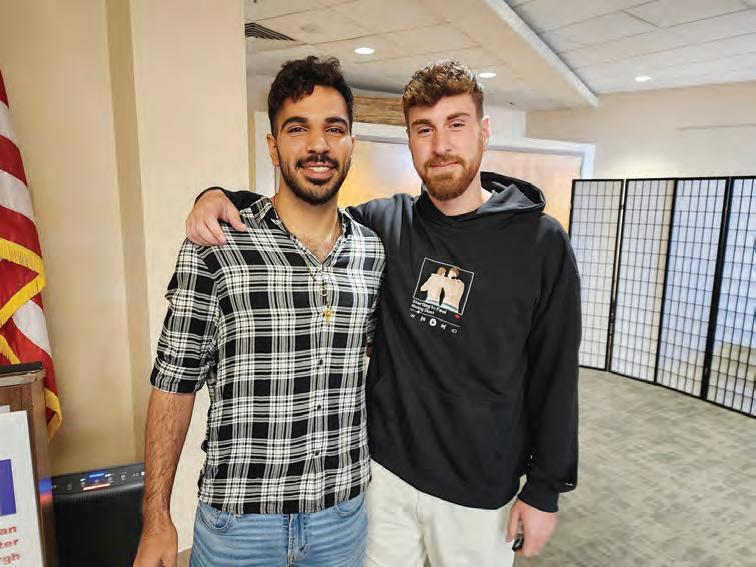
There were gunshots everywhere and terrorists all around,” he said.
Seelenfreund described exiting his vehicle, reentering his vehicle and thinking, “How many terrorists can there be in Israel? It can’t be possible.”
Seelenfreund said his friend drove toward a forest and then a vineyard.
“We encountered five terrorist groups after everything we encountered,” he said.
The friends eventually reached a gas station “about an hour from the festival,” Seelenfreund said. A police officer directed them to a nearby shelter, but Seelenfreund refused to go. Instead, he and his friend headed toward a kibbutz.
“We saw hundreds of people injured,” Seelenfreund said. “Everyone was in shock.”
Seelenfreund said he tried reaching out to people from the festival but couldn’t get through.
“I lost a lot of friends that day,” he said. “I know 16 people that died. Seven were close friends.”
Seelenfreund said he spent hours pondering what to say at his best friend’s funeral.
“That’s a f--ked up thing to think about,” he told the students. “People our age shouldn’t have to think about that.”
Yesharim began his speech by showing photographs.
“I want you to meet my friends,” he said. “We were having the best time together.”
“At 6:29 a.m. everyone was waiting for sunrise. We hear the bombs and I think, ‘This is an amazing production,’” Yesharim said with a laugh.
He and a friend immediately entered a vehicle and began driving. They ignored their GPS’ instructions and headed toward a shelter, he said.
“We have snacks, we have water, we have weed, we can stay in a shelter for a week,” he joked again.
Yesharim told the students he kept thinking, “There’s no way there are terrorists in Israel.”
He refused to send “last words” to his family via text.
“I have so much more to do,” he said.
Yesharim and his friend eventually made it to an IDF base. For 90 minutes they begged to enter a secure area. “We told them we are Israeli and we will go in naked,” he said.
A Bedouin member of the IDF ran toward them, Yesharim said. “He let us in.”
Yesharim and his friend entered a space
where “so many people are trying to figure out what the hell is going on.”
Around 1 a.m. on Oct. 8, Yesharim and his friend were told it was safe to leave, he said.
The drive home was “disgusting. The scent was terrible. There were bodies of terrorists, bodies of Israelis, so many crashed cars.”
Yesharim arrived home around 1:30 a.m.
“I started crying and fell on the floor,” he said.
Then he went to sleep.
“When I woke up I was already alerted to show up for reserve duty,” he said.
Yesharim said he began looking through missing person posters. He said he found one of himself.
“Imagine seeing that,” he told the students. Yesharim said he immediately visited a “healing center” where he learned to deal with the effects of trauma. “That center saved my life.”
The Israeli, who prior to Oct. 7 intended to become an electrical engineer, began freediving. He showed a video of himself descending the Red Sea.
Plunging beneath the surface was the “first time I could just be, and not deal with so many thoughts in my head,” he said.
Yesharim said he’s become a free dive instructor “in order to give back,” and that he’s also attended several festivals since Oct. 7.
“Every party I go to and I see the sunrise I shout and I cry, but my friends embrace me,” he said.
“It doesn’t matter what we go through,” he told the students. “If you make up your mind and decide to get through it you can.”
Seelenfreund and Yesharim’s talk was supported by Survived to Tell, a project of Israel-Is, a non-government organization whose mission is to connect young Israelis with their global peers.
Please see Survivors, page 11

asked if she could sing. That led to the creation of her first production, “Broadway Bible.”
By David Rullo | Senior Staff Writer
Music has always been a part of Rabbi Deborah Zecher’s life.
The Pittsburgh-area native grew up in Monroeville and was passionate about music, despite her high school not having a musical theater program.
The fact that she decided to become a rabbi rather than a cantor may have come down to circumstance.
“I had never seen a cantor,” she said.
What Zecher said she did have growing up was a strong role model in Rabbi Jason Edelstein at Temple David, the Reform congregation her family helped found in Monroeville.
Knowing that music was something she would always return to, Zecher left the area, first for college and then Hebrew Union College-Jewish Institute of Religion, where she was ordained in 1982, becoming one of the first 50 female rabbis in the world.
Her vocation allowed her to wed her two passions — Torah and music —serving as both rabbi and cantor at all the congregations she served after her first pulpit.
In 1995, Zecher was asked to deliver a guest lecture at a synagogue. Instead, she
The singing rabbi’s focus began to shift after that initial night of song when she began taking cabaret classes.
In 2008, Zecher created “Warm Up the Winter,” a concert to raise money for fuel assistance in Massachusetts, where she was living.
“I’m really proud to say that program still exists 17 years after I did the first and they’ve raised $200,000 for fuel assistance,” she said.
In 2014, Zecher decided to make cabaret her full-time focus, retired from the congregation she was serving and moved to New York.
The now professional performer thought that when she stepped away from the bimah that she would be leaving behind the Jewish part of her vocation. That would change after a brief conversation with someone at a concert.
“She said, ‘That’s the essence of cabaret. Cabaret is a way of telling your story, speaking your truth through music and storytelling.’ I thought, you know what, she’s right. So, my cabaret shows all have a Jewish component to them,” Zecher said.
She now travels the country bringing her passion for both cabaret and Judaism to different synagogues and nightclubs.
“I’m really proud that my shows have been recognized with nominations for





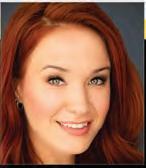







Carolyn Leigh,” Saturday night. The concert is the finale of a weekend of learning and music.





“Friday night I’m doing a program called ‘Sermon in a Song,’” she said. “The idea is that when a rabbi writes a sermon you have to try to have a theme, a text that you play with. So, I have put together a list of 20 themes and instead of using Bible or Talmud text, I will sing a song that illustrates one or more of those values and I’ll ask the congregation to decide what value is demonstrated.”
During a lunch-and-learn Saturday morning, Zecher will perform “Broadway Bible-Torah study through the Lens of Musical Theater.” The program connects familiar Torah and Midrashic texts with show tunes.
“I’m excited to say, I think a lot of what she’s going to do will be fun,” he said. “It’s a fun new perspective of looking at Jewish concepts in a way that, I think, some of will be kind of lighthearted. Some it will also draw new perspective, tying old stories of the Torah in ways we haven’t always looked at them.”
A ll events are free and open to the public, but registration is required for both of Saturday’s events at templesinaipgh. o rg/event/rabbi-deborah-zecher-concert. html. PJC
David Rullo can be reached at drullo@ pittsburghjewishchronicle.org.


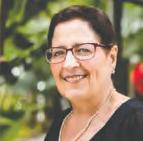
By Abigail Hakas | Special to the Chronicle
At a county fair in France, a young Solange Lebovitz noticed everyone staring at her. A shy girl, she quickly deduced the reason: Her yellow star marking her as Jewish. She took it off and said, “I’m not wearing it anymore.”
Lebovitz told her story through a pre-recorded video and a live talk for a Holocaust Center of Pittsburgh event at Edward Danforth Theatre at Chatham University’s Shadyside campus on Sept. 12.
Her parents, Rosa, née Hershkovitz, and Eizik Dratler, moved from Sighet, Transylvania, to Paris in 1925. Lebovitz was born five years later, one of six children. She was a sickly child and was sent to a preventorium in the mountains in 1938, just before the war began. She spent a year writing letters to her family before being sent back to Paris.
One of her older sisters had married a man from Budapest at the beginning of the war, but he was taken as a prisoner of war, so Lebovitz’s parents sent her to live with Regine in Le Loire Val, a province in France.
A French collaborationist government based in the city of Vichy governed unoccupied France, and in 1940, the government pushed antisemitic

legislation similar to Nazi Germany’s.
Lebovitz had to register as Jewish, going to the city of Autun around 25 miles away to be given a yellow star to sew on her sweater.
The French authorities placed thousands of Jews in heinous conditions in French-run detention camps, where at least 3,000 died during the war.
Lebovitz’s sister was arrested but was released quickly because there were no German soldiers at the time. After that, Lebovitz was sent to stay with the Barbiers, an older French couple in Normandy.
until the French liberation.
The Catholic couple sent her to public school and church every Sunday. While she suspected some of the girls at the school or church also were Jewish, the fear of arrest — or the arrest of their caretakers — meant none of them inquired if the others were Jewish.
The director of the school, Lebovitz said, was smart and knew when the Germans were coming, so she sent Lebovitz to supervise the kindergarten class. Lebovitz didn’t fit the German stereotype of what a Jewish person looked like; she had red hair and blue eyes.
closed the door and left.
Back in Paris, her family faced hardships. In 1941, Nazis bombed six synagogues and one Jewish prayer house in the city. A year earlier, a German census registered 150,000 Jews in Paris. Jewish people had to register with the police to be given an identity card with a Jewish stamp on it. If they didn’t, they couldn’t get ration tickets to buy food.
Eventually, Jews were arrested. Some of them were transferred to Drancy, a concentration camp where they were held before being sent to other camps.
In 1942, French police held 13,000 Jews in Paris’ Vélodrome d’Hiver sports arena. They were held without food or water before they were deported via Drancy to Auschwitz-Birkenau.
Thousands of Jews went into hiding, but nearly 30,000 were deported from Paris during 1942. Only 60,000 Jews remained by mid-1943.
Lebovitz’s family in Paris had split up. Her mother and oldest brother went to Limoges, while another brother and her father stayed in a small apartment in Paris.
One day, a friend warned them they would be arrested; someone denounced them to the police for a monetary reward. Her father and brother climbed out a window onto the roof and then slid down a waterspout into the alley to escape. — LOCAL —
The Barbiers had a beautiful house off the main road with a pressoir to make cider. Lebovitz spent more than two years with them
Once, she saw the door to the class open and a German soldier looked inside. He saw the small children and looked at Lebovitz, then
5505 Forbes Avenue Pittsburgh PA 15217 TempleSinaiPGH.org
Registration required RSVP to DANIE OBERMAN
Community Engagement Director Danie@TempleSinaiPGH.org (412) 421-9715 ext. 121
Weather permitting, services will be outside in the Bodek Rose Garden.
Bring your TOTS to Temple Sinai tocelebrate the High Holy Days!
TOT SERVICES: A fun, active service led by Cantor David Reinwald and Rabbi Daniel Fellman with stories, singing, and dancing for families with children ages 0–5.
Erev Rosh HaShanah
Wednesday, Oct. 2, 5:15 PM
Kol Nidre
Friday, Oct. 11, 5:15 PM
Snacks & Fun start at 5 PM.
TOT PROGRAM: Join Danie Oberman and Alex Dolinger for singing, dancing, and fun holiday focused activities for children ages 0–5.
Rosh HaShanah
Thursday, Oct. 3, 8:15 AM
Yom Kippur
Saturday, Oct. 12, 8:15 AM
Snacks & Fun start at 8 AM.
Submit calendar items on the Chronicle’s website, pittsburghjewishchronicle.org. Submissions also will be included in print. Events will run in the print edition beginning one month prior to the date as space allows. The deadline for submissions is Friday, noon.
FRIDAY, SEPT. 20
Join Rodef Shalom Congregation Cantor Toby Glaser for an abridged 20s-40s Kabbalat Shabbat service. Get to know other Pittsburgh young Jewish professionals and close out the week with wine, a nosh and great company. Registration required. Free. 7 p.m. rodefshalom.org.
SATURDAY, SEPT. 21
Join Temple Sinai for Jewish Caroling: The Music of Carole King, Carole Bayer Sager and Carolyn Leigh, with Rabbi Deborah Zecher. Free and open to the public. Reservations and donations appreciated. 7 p.m. 5505 Forbes Ave. templesinaipgh.org/programs-events.
SUNDAY, SEPT. 22
Join Chabad of the South Hills for the CKids Rosh Hashana Airlines and prepare for a sweet new year. Fanny pack and luggage tag gift for each child. In-flight entertainment. DIY apple and honey cake pops. $15. 4 p.m. 1700 Bower Hill Road. chabadsh.com/airlines.
MONDAYS, SEPT. 23–DEC. 30
Join Congregation Beth Shalom for a weekly Talmud study. 9:15 a.m. For more information, visit bethshalompgh.org.
Join Temple Sinai for an evening of mahjong every Monday (except holidays). Whether you are just starting out or have years of experience, you are sure to enjoy the camaraderie and good times as you make new friends or cherish moments with longtime pals. All are welcome. Winners will be awarded Giant Eagle gift cards. All players should have their own 2024 mahjong cards. Contact Susan Cohen at susan_k_cohen@yahoo. com if you have questions. $5. templesinaipgh.org.
TUESDAY, SEPT. 24
Join Chabad of the South Hills to hear Moria Azulay and Or Barak present Faith and Resilience: Israel after October 7. Moria served as a combat soldier in the Jordan Lions Battalion and is a social media content creator, who has been creating content for Israel advocacy organizations. Or served as combat support in the Gaza divisions. He is a photographer and is a producer of music videos and films. 7 p.m. $18 suggested donation. Address given upon registration. chabadsh.com/Israel.
WEDNESDAYS, SEPT. 25–DEC. 18
Temple Sinai’s Rabbi Daniel Fellman presents a weekly Parshat/Torah portion class on site and online. Call 412-421-9715 for more information and the Zoom link.
Bring the parashah alive and make it personally relevant and meaningful with Rabbi Mark Goodman in this weekly Parashah Discussion: Life & Text. 12:15 p.m. For more information, visit bethshalompgh.org/life-text.
THURSDAY, SEPT. 26
The Holocaust Center of Pittsburgh is pleased to welcome Alex Kor and Graham Honaker for A Blessing, Not a Burden: The Story of Two Holocaust Survivors, Eva and Mickey K 6 p.m. Rodef Shalom Congregation, 4905 Fifth Ave. eventbrite.com/ e/995324782217?a =oddtdtcreator.
SATURDAY, SEPT. 28
Join Temple Sinai and Rodef Shalom Congregation for guest speaker Rabbi Michael Zedek, dessert, reception and service with Rabbi Daniel Fellman, Cantor David Reinwald, Rabbi Sharyn Henry, Cantor Toby Glaser and the Temple Sinai and Rodef Shalom combined choirs. 7:30 p.m. Rodef Shalom Congregation, 4905 Fifth Ave.
Everyone is invited to Temple Ohav Shalom for a Selichot Sound Bath. Prepare for the Jewish New Year with Havdalah and a meditative soundscape featuring singing bowls and other healing instruments. To relax on
Our readers are invited to submit poems to the Chronicle’s Poetry Contest. Winning entries will be published in our Oct. 4 issue. The theme is “One year since Oct. 7.”
Three winners will each receive a $54 gift card to Pinsker’s Books and Judaica, supplied by an anonymous donor. All submissions must be received no later than Sept. 20.
Guidelines:
Poems must be submitted to newsdesk@ pittsburghjewishchronicle.org. Please type “Poetry Contest” in the subject line. The poem must be in a Microsoft Word file. No PDFs or handwritten entries will be accepted.
• One submission per author.
• Must include the author’s name, address, phone number and email address.
• Poem should reflect the theme of “One year since Oct. 7.”
• Unpublished poems only. PJC
5915 Beacon Street • Pittsburgh, PA 15217
Friendly, Egalitarian, Conservative
JOIN NEW LIGHT FOR THE 2024 HIGH HOLY DAYS services to be held ON-SITE in our chapel and via ZOOM registration required: janet@newlightcongregation.org
rosh hashanah
wednesday, october 2nd 7:00 pm
thursday, october 3 8:45 am friday, october 4th 8:45 am yom kippur kol nidre: friday, october 11th 6:30 pm saturday, october 12th 8:45 am neilah: saturday, october 12th 6:20 pm
cemetery visitation - new light cemetery - 750 soose road - shaler, pa sunday, september 29th 10:00 am - 1:00 pm
Contact Information: Registration: janet@newlightcongregation.org Website: newlightcongregation.org
Membership: membership@newlightcongregation.org
the floor, bring your own mat, blanket and comfort items. Chairs and a limited number of mats will be provided. RSVP required. 8 p.m. 8400 Thompson Run Road, 15101. forms.gle/1ezybsvudP8dmjp26.
SUNDAY, SEPT. 29
Bring your family for a pre-High Holiday challah bake, complete with crafts, storytelling and a shofarmaking workshop. 1 p.m. $10/child. Chabad of Squirrel Hill, 1700 Beechwood Blvd. chabadpgh.com/ kidscooking.
Join Rodef Shalom Congregation for “Taking Miracles Seriously: A Journey to Everyday Spirituality,” the 2024 Ruth and Bernard Levaur Contemporary Lecture with guest speaker Rabbi Michael Zedek. This event is free and open to the public. Seating is limited and reservations are encouraged. Reception to follow. 7 p.m. 4905 Fifth Ave. rodefshalom.org/levaur.
Join the Jewish community for a “Bring Them Home Vigil” in support of the hostages still being held by Hamas. The vigil will start with calling the names of the IDF soldiers who were killed in the last week followed by one minute of silence. Noon. Corner of Murray Ave. and Darlington Road.
MONDAY, SEPT. 30
Join Rodef Shalom Congregation for Wise Aging: High Holy Days. Consider and discuss “Asking for and Granting Forgiveness: How the Conversation Changes as We Grow Older.” This experience is designed for Jewish adults 55 and older. $18. 7 p.m. rodefshalom. org/wiseaging.
THURSDAY, OCT. 3
Join Chabad of Squirrel Hill’s Camp Gan Israel and Community Day School for Shofar in the Park with snacks, games and more. 4 p.m. CDS playground. 6424 Forward Ave. chabadpgh.com/shofar.
MONDAY, OCT. 7
Join the Jewish community to mark the first
anniversary of Hamas’ terrorist attack on Israel. Gather in front of the JCC to commemorate the lives lost, people injured and hostages taken. No registration necessary. Free and open to the community. 6:30 p.m. JCC Squirrel Hill, 5723 Darlington Road. jewishpgh.org/ event/october-7-commemoration.
WEDNESDAY, OCT. 9
Join the Squirrel Hill AARP for a lunch brunch. Noon. Ritters Dinner. RSVP to Gerri Linder before Oct. 3 at (412)421-5868.
WEDNESDAYS, OCT. 16; NOV. 20; DEC. 18
Join AgeWell for the Intergenerational Family Dynamics Discussion Group at JCC South Hills the third Wednesday of each month. Led by intergenerational specialist Audree Schall. The group is geared toward anyone who has children, grandchildren, a spouse, siblings or parents. Whether you have family harmony or strife, these discussions will be thoughtprovoking, with tools to help build strong relationships and family unity. Free. 12:30 p.m.
SUNDAY, OCT. 20
Join Chabad of Squirrel Hill for a Family Sukkah Party. Shake the lulov, eat pizza, and enjoy music and crafts. 5 p.m. 1700 Beechwood Blvd. chabadpgh.com/ sukkahparty.
TUESDAY, OCT. 22
Fact or fake? With the plethora of AI, special interests, social media, websites and newsletters, how do you discern what is true and what are lies? Join Temple Sinai for Disinformation & the Election: A Panel Discussion sponsored by Women of Temple Sinai to discuss how groups circulate incorrect information about voting and elections with the intent to mislead and confuse voters and then spread that disinformation. Bring your dinner; water, lemonade and a sweet treat provided. Free and open to the public, registration required. 6 p.m. templesinaipgh.org/ programs-events. PJC
The Pittsburgh Jewish Chronicle invites you to join the Chronicle Book Club for its Sept. 22 discussion of “The Singer Sisters,” by Sarah Seltzer. From the Jewish Book Council: “Journalist and cultural critic Sarah Seltzer has written a remarkable debut novel that taps into her deep well of knowledge about feminism and rock history. 'The Singer Sisters' is about two generations of a folk-rock dynasty and the sacrifices these female artists must make in the pursuit of their dreams."
“The chief protagonists, though ‘antagonists’ might be a better word, are 1960s folk legend Judie ... and her nineties-era, black nail polish–wearing, alt-rock daughter, Emma. This ingenious story weaves in fascinating subplots about other members of their talented clan as it explores the conflict between being a mother and writing great songs.”
The author may join us for the meeting.
Your hosts
Toby Tabachnick, editor of the Chronicle
David Rullo, Chronicle senior staff writer
How it works
Rabbi Jonathan Perlman
Rabbi Iscah Waldman, Guest Rabbi october 3: “You don’t have to be a perfectionist!” october 4: “Where was Sarah when Isaac accompanied his father to Mt. Moriah?” october 11: “How you can save the world by the Three Covenantal Methods.” october 12: “The Angst of Jewry after October 7th and the Challenge to Belief.”
We will meet on Zoom on Sunday, Sept. 22, at 1 p.m.
What to do
Buy: “The Singer Sisters.” It is available at some area Barnes and Noble stores and from online retailers, including Amazon. It is also available through the Carnegie Library system.
Email: Contact us at drullo@pittsburghjewishchronicle.org, and write “Chronicle Book Club” in the subject line. We will send you a Zoom link for the discussion meeting. Happy reading! PJC
— Toby Tabachnick


www.pittsburghjewishchronicle.org
By David Rullo | Senior Staff Writer
Jonathan Conricus is the senior fellow at the Foundation for Defense of Democracies and the former interna tional spokesperson for the Israel Defense Forces. He also has served as a military diplomat and United Nations liaison.
Conricus was in Pittsburgh to deliver the keynote address at StandWithUs’ inaugural community reception on Sept. 12. He sat down with the Chronicle to discuss Israel’s war with Hamas, the hostages and protests around the country.
The interview has been edited for length and clarity.
Why did StandWithUs ask you to deliver the keynote address at its reception?
Since the war, they’ve been doing weekly briefings on YouTube and their social media platforms, and I’ve been part of their weekly briefings. They usually invite interesting guests from various walks of life. I do the military part.

are still kept hostage even though they have credentials as peace activists and people who have been doing the Palestinian work for years. I think this is the most important perspective for Jews in America to understand — yes, these are terms that are dirty, they’re coarse, they’re inconvenient for a sophisticated and cultured Jew in America to say and think, but we are dealing with monsters. We are dealing with terrorists that believe that Jews do not have a right to exist in this land that we call Israel, and that the only way to deal with us is to kill us or force us to convert and subjugate us to their rule. Those are the options from Hamas’ perspective, and it is saddening that there are so many Jews who don’t understand this, who refuse to acknowledge reality and who do the enemy’s work.
How much do the protests by groups like Jewish Voice for Peace matter in Israel?
space to the other side: Hamas supporters, Iran supporters and useful idiots. Sadly, I know of other communities that don’t get it. They’re afraid. They fear taking a moral stand. They fear standing with Israel. They think wrongly that if they’ll just be quiet and not show their Jewishness and not show love or support for Israel, things will go away and be okay. That is wrong. The opposing forces in the U.S. show very clearly that this is about attacking Jews. We see it on campuses. We see it in the rhetoric. It’s not about Netanyahu or Israeli operations in Gaza. Those are pretexts. It’s about undermining the rights, the freedom and dignity of Jews in America.
Yesterday, Hamas announced it was ready to accept a cease-fire without new conditions. Do you believe them?
No. I don’t think that Hamas is motivated to return our hostages. I think that they’re holding on to the hostages as their life insurance policy. That’s what I’ve been saying since January, and I wish to be wrong about it. I’m pessimistic about the chances of getting the hostages back, not because of the actions of the Israeli government. The issue here is that Hamas took them to negotiate for political gain. They are cruel, inhumane and they will hold on to them until they think that they can’t get a better deal.
There is tension about whether the mission should be to eliminate Hamas or negotiate a return of the hostages. Are they separate, and on what do you think the Israeli government should be concentrating?
On the one hand, they’re separate. On the other hand, they are part of the same challenge. And on the third hand, there is a tension between the immediate achievement of both. I say this with utmost compassion towards the families with whom I share their suffering. From a strategic national perspective, what Israel needs to do is defeat Hamas, to make it clear to any terrorist organization that will ever think of attacking Israel again what the consequences are for doing the atrocities of Oct. 7, for murdering and raping and burning and torturing and all of the things that they did. Having said that, the ultimate priority is to defeat Hamas, unequivocally, but a top priority should be to get the hostages back.
How does Israel keep its focus on the growing threat of Iran while fighting these proxy wars with Hamas and Hezbollah and the Houthis?
You do it by totally changing your national strategy and acknowledging that Iran has
formulated a very effective strategy. They have implemented it with a lot of discipline and long-term patience. They’ve built proxy organizations around Israel and encircle us in a ring of fire. Their aim is to fight the war of attrition against us, to get us weak enough and exposed enough for a military defeat. According to what the Iranians say — according to their documents, statements by their leaders, the people who govern, the Supreme Leader himself and others — their aim is to try to destroy Israel. We should listen and we should take active countermeasures to make that exercise something that is not worth it for the Islamic Republic of Iran. We should have a strategy that is comprised of economic, information, diplomatic and military components. The strategy should be to undermine the stability of the Iranian regime. To force it to play defense, to undermine its ability to create revenue and to force upon them a dilemma where they spend their hard-earned dollars to continue to provide to terrorist organizations or to safeguard their own regime. Israel needs to get support from the U.S. and other countries. It should state very clearly to Iran and its proxies that the next time that one Iranian proxy fires a weapon that came from Iran, Israel will see that as a direct attack by Iran on Israel and will retaliate accordingly.
Have you been surprised by the protests you’ve seen in America, like the one scheduled to take place at your talk?
No, it doesn’t surprise me. It sorrows me to see Jewish brothers and sisters doing it, playing into the hands of the enemy, being useful idiots for Iranian and Hamas propaganda. They are on the wrong side of history and are aiding and abetting the enemy. They are providing legitimacy to terror organizations who would butcher them. Jewish Voice for Peace and all the other clowns around would be butchered just the same way as the beautiful, gentle souls in Israel on Oct. 7. Peace activists and people who spent most of their adult lives advocating on behalf of Palestinians were butchered with the same brutality as other Israelis. And some of them
Public discourse is important in the West. The most important country in the world for Israel is the U.S. Supporting Israel in media, politics, on campuses is very important. There are many positive examples of communities that are organized, focused and understand that they need to fight, they need to push back, they need to be out on the streets and not relinquish the public
There are many good examples of brave, smart, connected, resourceful and influential Jews who are doing tremendous things. I think we’re seeing a pushback now in universities by organizations like StandWithUs that are making a difference with lawsuits, with informing Jewish students about their rights, giving them access to information, explaining complex issues that they maybe haven’t encountered before. They give them access to clear, verified and trustworthy information. PJC
David Rullo can be reached at drullo@ pittsburghjewishchronicle.org.


Artists friends of Lila invite you to join them

To honor the memory of Lila
Wednesday, September 25 • 11 am
JCC of Greater Pittsburgh Art Studio Room 154
Robinson Building Lower Level 5738 Darlington Road
By Adam Reinherz | Senior Sta Writer
When the government came to Community Day School, the first thing it heard was hope. Erupting from the mouths of uniformed third graders were the words “Im tirtzu ein zo agadah
Hebrew for “If you will it, it is no dream,” the song, which was sung by students standing beside an outdoor Holocaust memorial, signals the institution’s aims, Head of School Casey Weiss told U.S. Department of Education Deputy Secretary Cindy Marten, elected officials and representatives from the Department of Education and Department of Homeland Security on Sep. 13.
Behind the students is a sculpture bearing 6 million pop tabs — one for each Jewish victim of the Holocaust — but “we are not victims,” Weiss said.
The Gary and Nancy Tuckfelt Keeping Tabs Holocaust Sculpture, like lyrics stemming from a quote uttered by Zionist visionary Theodor Herzl, is a call forward, she continued.
Every morning, the Jewish day school’s run club (led by Weiss) departs from the sculpture site.
The intent isn’t solely to develop better athletes. The club, like wider educational goals,

day schools provide a cocooned environment for students to grow, children told govern-
What needs to happen so “more students can do what we do and have what we have?”
“I love that you appreciate that,” Marten
The deputy secretary, who began her career as a second grade teacher at Beth Israel Day School in San Diego, pointed to the BidenHarris administration’s strategy to counter antisemitism, “which we released before Oct. 7.”
One of the top priorities since coming to office was developing and implementing this strategy, she continued. “President Biden, as you may know, ran for president because of the antisemitism that was on display in Charlottesville. So the administration has understood this from Day 1.”
“There are groups of people who are working to make sure that your faith traditions, your places of worship and that your schools are safe across the entire country,” a
On Sep. 25, a national summit on K-12 school safety and security will be administered by DHS and the Cybersecurity
FRIDAY,OCTOBER4@10:30am-12:30





Brown University trustee resigns in protest of school’s upcoming Israel divestment vote
A Jewish member of Brown University’s governing board has resigned in protest ahead of a vote next month on whether the school will divest its endowment from companies linked to Israel, according to JTA.
Joseph Edelman, a New York hedge fund manager, called the decision to proceed with such a vote “a stunning failure of moral leadership” in his resignation letter, a version of which he published in the Wall Street Journal on Sunday. Edelman said the divestment vote, agreed to as part of a deal with pro-Palestinian student activists, represents an unacceptable concession to forces that call for Israel’s destruction and are responsible for rising antisemitism on campus.
“The university leadership has, for some reason, chosen to reward, rather than punish, the activists for disrupting campus life, breaking school rules, and promoting violence and antisemitism at Brown,” Edelman wrote. Edelman’s firm did not immediately respond to a request for further comment.
A spokesperson for Brown University said Edelman acted on a “misunderstanding” of how the school had reached its decision to hold a vote this October.
“Far from a direct response to current activism, Brown is following an established process that is nearly a half-century old,” spokesperson Brian Clark told Bloomberg News. “This long-held process is built on the principle that
Brown has an obligation to examine and investigate claims challenging its moral responsibility.”
Leaders of white supremacist group charged for urging terrorism against Jews and other targets
The Justice Department has charged leaders of a transnational white supremacist terror group with urging their followers to commit terror attacks against Jews and other minority groups, JTA.org reported.
One of their proposed targets allegedly included a Jewish senator.
The charges announced Monday against Dallas Humber, 34, of Elk Grove California, and Matthew Allison, 37, of Boise, Idaho, include “soliciting hate crimes, soliciting the murder of federal officials, and conspiring to provide material support to terrorists,” according to a statement from the department. If convicted, they each face a maximum penalty of 220 years in prison. The case was investigated by the FBI.
According to the indictment, in 2022 Humber and Allison became leaders of the Terrorgram Collective — a network on the social media platform Telegram that promotes white supremacy, terrorism, the collapse of the government and the rise of a white ethnostate.
The indictment alleges that Humber and Allison used Telegram, a platform with few restrictions that is popular with extremists, to solicit users to commit hate crimes. They posted instructions for writing white supremacist manifestos; demonstrated how to build bombs, firearms, detonators and chemical weapons; and provided guidance on how to commit an attack, at times without getting caught.
Sept. 23, 1920 — Shas Rabbi
Ovadia Yosef is born
Items
Sept. 20, 1890 — Poet Rachel Bluwstein is born
Rachel Bluwstein, considered one of the four founding mothers of modern Hebrew poetry, is born in Russia. She is one of the first modern poets to write in Hebrew in a conversational style.

Sept. 21, 2010 — International law scholar Shabtai Rosenne dies Diplomat and legal scholar Shabtai Rosenne, a Bar-Ilan University professor, dies of a heart attack at 92. He contributed to the law of treaties and the law of the sea and formulated Israel’s 1949 armistice agreements.
Sept. 22, 1943 — Musician Ariel Zilber is born Singer-songwriter Ariel Zilber is born in Tel Aviv. In the 1970s and 1980s, he establishes an eclectic sound, leads multiple rock bands, then has a solo career. He spans rock, pop and hip-hop. He moves toward the Orthodox right in the early 2000s.
A school district in Columbia, South Carolina, will no longer use a graphic novel about local Holocaust survivors in its middle school curriculum, saying it violates new state guidelines governing which books are “appropriate” for the classroom, JTA.org reported.
A spokesperson for the Lexington One school district said that the book “We Survived the Holocaust,” written to educate young readers, will no longer be used in its fifth and sixth grade classrooms. The decision follows the passage this summer of restrictive new guidelines on instructional materials at the State Board of Education.
“This decision is based on a thorough evaluation of the suggested book, ‘We Survived the Holocaust,’ to determine its age appropriateness in accordance with State Board of Education Regulation (SBE) 43-170, which clarifies standards for the selection of instructional material,” district spokesperson Megan Moore told the Jewish Telegraphic Agency. Moore added that the book would still be available for eighth graders, and in its school library.
The decision is reminiscent of policies that have recently limited the reach of Jewish books across the country, including in South Carolina. Another district in the state briefly pulled “The Fixer,” the Bernard Malamud novel about antisemitism, from its shelves last year, restoring it after a panel review; districts in Florida, Texas and beyond have pulled various versions of Anne Frank’s diary, “Maus” and other books about the Holocaust and Jewish identity.
synagogue
A federal grand jury indicted an Ohio man last month for a December attack outside of a Washington, D.C. synagogue in which he reportedly yelled “Gas the Jews,” according to JTA.
He was indicted on three counts of “obstructing by force or threat of force a person’s enjoyment of their free exercise of religious beliefs, while using a dangerous weapon,” a statement from the Justice Department said.
The indicted suspect is Brent Wood, 35, who on Dec. 17 drove a U-Haul truck around the security barriers of Kesher Israel, parked on the sidewalk in front of the synagogue, sprayed a “noxious aerosol” and yelled, “Gas the Jews!” at congregants, according to the indictment. (The synagogue is also known as the Georgetown Synagogue.)
Wood was arrested that day and was also charged with simple assault in D.C. Superior Court. He has been considered a fugitive since he failed to appear for an arraignment in January. He faces a statutory maximum prison sentence of 20 years for each of the three federal counts.
The FBI’s Washington Field Office is investigating Wood’s case, and Assistant U.S. Attorney John Crabb Jr. is prosecuting.
“Number one, I’m thankful nobody was badly hurt,” Kesher Israel’s rabbi, Hyim Shafner, told the Jewish Telegraphic Agency. “On the other side of that coin is it did bring attention to the rise in antisemitism.” PJC
Compiled by Jarrad Saffren
Rabbi Ovadia Yosef is born in Baghdad. He moves to Jerusalem at age 4. He is Israel’s chief Sephardi rabbi from 1973 to 1983, then serves as the spiritual leader of Orthodox Sephardi political party Shas.
Sept. 24, 1950 — Operation
Magic Carpet concludes
Two planes carrying 177 Jews to Israel from Aden mark the end of Operation Magic Carpet, the airlift of nearly 50,000 Jews from their ancient community in Yemen over 15 months.
Sept. 25, 1917 — Poet Amir Gilboa is born
Amir Gilboa, one of Israel’s leading poets, is born as Berl Feldmann in Ukraine. His contemplative, often heavy poems draw on his military experiences and biblical issues of morality.
Sept. 26, 1955 — Oil is found in Heletz Oil is discovered in Heletz, a moshav founded by Yemeni immig rants in southern Israel.
Holding an estimated 94.4 million b arrels of oil, the field provides the state’s first successful wells. PJC



JAA:
Continued from page 1
And while the JAA will own and manage the property, Plung said Continental will “bring their knowledge on apartment leasing, apartment living and independent living.”
The new campus configuration will also allow the JAA to expand its home health services, Sivitz Hospice & Palliative Care and Mollie's Meals.
“We firmly believe the future of services to our seniors is both residential and at home,” Plung said.

JAA President and CEO Mary Anne Foley agreed.
“Those services that are without walls have a potential to really grow and support this community in a way that we’ve not always been able to support,” she said.
As an example, she said the organization’s home health program is something they could “triplicate” once the construction is complete.
“We will be seen and recognized as a premier provider of services,” she said.
While the new campus will be open to everyone, Plung said it will retain its Jewish character, something he noted that is important to the JAA board.
“There will be a synagogue as part of this new building,” he said. “It will be infused with Yiddishkeit. What Mary Anne and her team were most concerned about were the
Federation:
Continued from page 1
aftermath, the rise in antisemitism in our own backyard, the recent effort to place an antisemitic referendum on the City of Pittsburgh’s November ballot, and so much more,” Federation President and CEO Jeffrey Finkelstein said. “Through our response to each of these, and in everything we do for our community, we are driven and guided by our vision of creating a flourishing Jewish community where everyone — everyone, that’s all of you and people who are not here — feels included, supported and inspired. And it all happens because of you, our generous supporters.”
During the past year, Pittsburgh’s Federation raised $8 million toward Israel relief, which combined with $850 million collected by the Jewish Federations of North America provided food assistance to more than 285,000 Israelis, treated 1.7 million patients and trained 190,000 counseling volunteers, according to Finkelstein.
“It would be hard to overstate the amount we accomplished as a community to support both the people of Israel and Jewish Pittsburgh,” he said.
Finkelstein, who marked his 20th annual address at the organization’s helm, cited the installation of an empty Shabbat table and seder table in Schenley Plaza, the hosting of two rallies and a Yom Ha’Atzmaut Israel Independence Day March, bussing of 400 people to Washington D.C. for the March for Israel, production of yard signs supporting Israel and “a ton of work in security” as examples of Federation’s local efforts to better community.
These actions are a result of “extraordinary fundraising achievements from this
values that the JAA brings to the table.”
Plung and Foley said that the new development is proof of the organization’s commitment to the community.
“This is a rebirth, a transformation,” Plung said. “This is JAA 3.0, and we’re excited to announce it.”
The JAA’s roots go back more than 100 years, to 1906, when the Jewish Home for the Aged was housed in a former mansion in the Hill District, according to the Rauh Jewish Archives. By 1910, the building was overcrowded and an annex was built to accommodate 40 additional residents. In 1933, the home moved to its new building on Browns Hill Road.
The facility at Browns Hill Road eventually

Rehabilitation Center and The Residence at Weinberg Village, a personal care facility. The JAA closed Charles Morris in January 2021, the result of the convergence of three factors: a significant gap between Medicaid funding and the cost of caring for Medicaid clients; a trend toward at-home care for the elderly; and the financial impact of the pandemic, including a marked decrease in short-term rehabilitation patients due to the reduction of elective surgeries. The JAA closed Weinberg Village at the end of 2022.
The new campus, Plung noted, honors the past — and the organization’s mission to provide care for the elderly — but also looks to the future.
“The needs of the future are different. We’re really excited about this.”
That future, Foley said, is responding to the needs of today.
“We are evolving into this new village because that’s what the community and the seniors want today,” she said. “The legacy programs that are no longer in existence served a purpose, but that purpose is different than today. We have to continue to evolve and change as the needs of the community are evolving and changing.”
The total cost of the project is estimated to be $50 million. PJC

past year,” Finkelstein said.
While the umbrella organization’s annual campaign raised $14.1 million, the Jewish Community Foundation added $21.8 million in assets. The Foundation now totals $351.8 million, the first time in its history to eclipse $350 million at year’s end.
“These dollars, expertly managed, will solidify our ability to support our community for generations to come,” Finkelstein said.
Along with touting organizational achievements from the past year, the Federation used its Sept. 11 program to present two community awards.
Past board chair David Sufrin received the Emanuel Spector Memorial Award.
“I have learned so much from my experiences, and I have been fortunate to share what I’ve learned to make our community a bit better,” Sufrin said. “In this organization volunteers do 10% of the work and get 90%
“We realize the future is different,” he said.
David Rullo can be reached at drullo@ pittsburghjewishchronicle.org.
in my professional career.”
As a Newark-based member of the FBI in 2001 and a Pittsburgh-based member in 2018, Brokos keenly observed devastating acts of terror and hate.
Still, she said, there’s cause for optimism. Brokos read “A Call to the Living,” a poem written by Algernon D. Black, a late teacher and leader emeritus of the New York Society for Ethical Culture.
Throughout her career, Brokos has transported its text from office to office.
She said she’s interpreted the poem differently throughout her life. Now, though, “what it means to me, especially in everything we’re facing is that we must keep on living, no matter how hard our days have been and will continue to be. We must keep living into the challenges we face as individuals and as a community, and we must keep the call and have faith in people.”
of the credit, and the staff does 90% of the work and gets 10% of the credit. So I want to take a moment to recognize and thank the professional staff of the Federation that, over the years with my involvement, have made Pittsburgh Federation one of the most highly respected Federations around the world and has provided strength and support to our beneficiary agencies in the whole Jewish Pittsburgh.”
Federation’s Director of Community Security Shawn Brokos received the Doris & Leonard H. Rudolph Jewish Communal Professional Award.
“The reason I’m getting recognized tonight is because of all of you. It’s the work I do, but it’s the work I do with all of you,” she said.
Brokos, who came to the Federation after nearly three decades of service to the FBI, told attendees that Sept. 11, 2001, and Oct. 27, 2018, are the “two most significant dates
It’s undeniable that “darkness” exists in the world, she continued, but “I have hope because I have tremendous faith in people. I have faith in me and I have faith in all of you.”
Brokos, who along with receiving a standing ovation from attendees credited her family, colleagues and the community with enabling her success, closed her remarks by citing and personalizing another familiar passage.
The late anthropologist Margaret Mead said, “Never doubt that a small group of thoughtful, committed, citizens can change the world. Indeed, it is the only thing that ever has.”
“We, we, all of us,” Brokos stressed. “All of us in this room tonight are that small group.” PJC
Adam Reinherz can be reached at areinherz@pittsburghjewishchronicle.org.
Continued from page 3
University of Pittsburgh student Yoni Preuss, 22, described the Israelis’ talk as valuable.
“Hearing these important stories, it’s difficult,” he said. “You never get used to it, but you understand it a bit, mentally, spiritually, physically. I think I grapple with it differently every single time, but it’s important to do so.”
Continued from page 5
Eventually, they took the train to Limoges and reunited with Lebovitz’s mother, moving from hotel to hotel. Her parents ended up convincing a man to let them stay in his apartment, and in return they provided him with food and drinks. Her parents hid their Jewish identity, instead saying they were refugees from the north where their house had been bombed. One day, the man said they must be Jewish because Lebovitz’s father did not eat pork. Her mother lied, saying he had a bad stomach, but they knew it wasn’t safe to stay, and left.
In August 1944, German forces in Paris surrendered. That same month, Lebovitz remembers standing on the main road and
CDS:
Continued from page 8
and Infrastructure Security Agency.
Apart from attending the webinar, where federal, state and local school leaders will share best practices for creating optimal learning environments, Marten encouraged students, teachers and parents to visit ed.gov and review “resources that we published and continue to publish.”
The Department of Education, led by Secretary Miguel Cardona, is committed to ensuring “all schools are a safe and inclusive learning environment.” Still, if a problem arises, it’s important to know where to turn.
“The first line of defense is always go to your principal,” Marten told the students. “It’s not always to only go to the federal government. But the federal government does have resources where there’s a climate on campus where a student doesn’t feel safe and they’re able to learn.”
Marten referenced the department’s Office for Civil Rights and its commitment to ensuring students are not discriminated against on the basis of race, color, national origin, sex, disability or age.
“People in Washington D.C. care a lot about you, about your safety,” Marten said. “There are resources and investments that we have made, and will continue to make, and that is led by our president and vice president.”
Shabbat is coming
Shortly after Marten concluded her comments, the Friday bell rang, signaling an early dismissal because of Shabbat. The visitors were each given a challah as a symbol of gratitude and acknowledgement of the coming Sabbath.
While children rushed through the hallways, gathered their belongings and headed outdoors,
“It’s exceedingly important that we continue to educate ourselves, continue seeking information on the events of Oct. 7 and amplify the voices of those who experienced it,” Pitt student Asher Goodwin, 22, said. Only by doing so can “we fully understand the gravity of the situation, why we are where we are now.”
Fellow Pitt student Ilan Gordon, 21, said it was important that Jewish and non-Jewish peers heard Seelenfreund and Yesharim’s accounts.
giving cider to convoys of American soldiers, who threw cigarettes and candy back to her.
Her parents sent her brother to find out if she was alive. He walked for almost 25 miles to get to her. In December, her father came to pick her up and took her back to Paris.
All eight members of Lebovitz’s family survived the war, but she lost many members of her extended family, including her 80-year-old grandfather Shimshon Hershkovitz and several of her father’s siblings: Rivka, Malke and Adolphe Dratler.
In 1952, she married Lazar, or Larry, Lebovitz, a Holocaust survivor from Czechoslovakia, and they moved to Pittsburgh. She had two children, and as they pursued higher education, she decided to get the education she couldn’t during the Holocaust. At 42, she enrolled at the University of Pittsburgh. At
“Hopefully we can spread that to the whole entire Pitt community,” Gordon said. Sharing what happened that day could help “humanize Israelis.”
Before the program’s close, Seelenfreund was asked about those who deny the atrocities of Oct. 7.
The Israeli, who said he’s shared his story nearly 50 times in the past year, recalled being told that Oct. 7 was nothing more than
said IDF helicopters shot civilians at the Nova festival, Seelenfreund said he stayed calm and simply replied, “I hope you don’t have friends who die at a party [attacked] by terrorists.”
Reaching a point where aggression is met with sangfroid took time, he said.
“I found that anger does nothing,” the Israeli told the students. “Love is so much stronger. If we keep looking for the good we’ll find it.” PJC
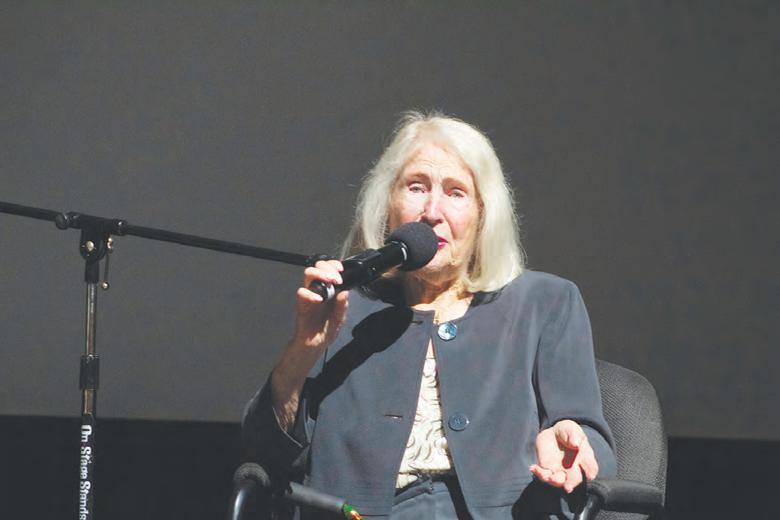
English and French literature.
In 2019, she published “Outrage and Hope,” a book of poetry inspired by her

Marten shared her impressions of CDS and the wider community with the Chronicle.
“Being here is like going back,” she said. “This did make me feel like being at home.”
Marten’s first educational job was at Beth Israel Day School. Its former principal Jill Green hired Marten to teach second grade, but the position was “very high stakes” because within the class was not only Green’s daughter but all of Green’s friends’ kids, Marten said with a laugh.
Marten spent seven years at the now defunct Jewish day school.
“My students had Hebrew studies and Judaic studies. We had Shabbat every Friday in my classroom. We had services every morning with the rabbi in the synagogue,” she recalled. “There’s a lot of my very early roots as a teacher that makes me feel like I’m home when I’m here.”
The deputy secretary credited Green with serving as a lifelong mentor and also pointed to her own mother’s influence.
“My mother [Fern Siegel] is very involved in the Jewish community in San Diego,” Marten said. “She was a president of our temple, Temple Emanu-El, in the early 90s. She was also president of Jewish Family Service in San Diego. For many years, she’s been very involved in mental health support for kids, and making sure we have more support for people experiencing
Adam Reinherz can be reached at areinherz@pittsburghjewishchronicle.org.
eriences during the Holocaust.
During the event, Emily Loeb, director of programs and education at the Holocaust Center, asked Lebovitz how poetry helped her process what happened to her.
“To tell you the truth, I don’t know,” Lebovitz said. “I’m emotional, I’m a child of the Holocaust period, and to me it just comes naturally, so I cannot really claim credit for it.”
Each piece is a delicate reflection of the turmoil Jewish people endured during the war.
“War is a tragedy,” one of her poems begins.
“Victory over evil is euphoric / For an instant, / But the pain and the losses, / The bloodshed, / The crimes / Remain a blot / On the glory of mankind,” the poem ends. PJC
Abigail Hakas is a freelance writer living

mental health issues. So I come from a family that is very dedicated to our Jewish identity and Jewish joy and the importance of education.”
Before becoming deputy secretary of education, Marten was a teacher, literacy specialist, vice principal, principal and superintendent.
Each position made clear that if students’ voices are ignored, or “if we don’t have the people that we work for at our tables, then what are we doing? We’re just adults making decisions about adults,” she said. “I always say, ‘When the kids are here, the boss is in the room.’ And President Biden is the boss. Secretary Cardona is the boss, but they will both also say, ‘Who do we actually work for? We work for the kids.’”
Marten praised state Sen. Jay Costa and Rep. Dan Frankel (both D-Allegheny) for joining the Sep. 13 program and heeding students’ concerns.
“Kids have a lot of ideas about how to help address what they’re facing, that are really smart ideas,” she said. “This is how we build good policy.” It’s similar to the educational concept of proximity, Marten continued. “The closer you are to the problem you’re trying to solve, the easier you’ll be able to solve it.”
As demonstrated by the students’ questions for government officials, Pittsburgh’s children
notice the ongoing Israel-Hamas war and rising antisemitism. The impact prompts concern, according to researchers, as even indirect exposure to conflict can result in stress and changes in development and learning.
CDS’ educators and the wider community are aware of their seismic responsibilities, Marten explained.
“This community seems to understand what it’s building and why it’s building it,” the deputy secretary said. These students are in an “incredibly wonderful community that has invested in them and cares about their education — not just for the short term, but for the long term.”
Before exiting CDS, Marten noted that time in Squirrel Hill and at the Jewish day school illuminated deeply held values.
When one of the students asked how the government can help other young people experience what’s experienced here, that was “a really beautiful thing,” Marten said. “The fact that this community has been through struggle and pain…and the students are saying, ‘We want better for everybody,’ that just for us is really beautiful. It says a lot about Pittsburgh.” PJC
Adam Reinherz can be reached at areinherz@pittsburghjewishchronicle.org.
Guest Columnist
Ben Wecht

To say that we live in divisive times has become almost banal. Increasingly, accusatory, disparaging and often hateful speech is normalized and accommodated everywhere. During an election year, in a nation as manifold as the United States, such discord is to be expected to some degree, and is in fact part of what makes American political life so robust, so lively, so adaptable. But as an American Jew and Zionist, I am alarmed by the discord that’s crept into our own community, our families and our circles of trust. Beyond any and all longtime schisms based on denomination, or affiliation, or nation of origin, or domestic politics, or even strategic approach to achieving peace for Israel, it has gone so far in some quarters as to espouse the notion that some of us are not to be trusted or taken seriously in our support for Israel — if not in our very Jewish identities — based on whom we back in the upcoming presidential election.
Much of this comes from the Republican camp, with unsupported accusations that one’s opponent “hates Israel,” or more troublingly, that Americans who support the Democratic party are “bad Jews.” But while
these comments may arise from an unfiltered bully pulpit, filtered down through a combination of right-wing media organizations and social media activity, such messages have gathered momentum and, ultimately, acceptance.
On the flip side, it also must be noted
350 was on display — from Reform Jews like me to members of the Orthodox community, from college students to the elderly, from clergy to professionals, from public servants to homemakers. Even from beyond our own tribe, those in attendance included Christians like Pittsburgh City Controller
Together, regardless of such differences, we mingled and noshed and listened and learned and applauded in common cause of our people and of our spiritual homeland, Israel.
that calling an opportunistic xenophobe a “racist,” or a failed and wannabe tyrant a “fascist,” is not exactly adding to the level of the public debate.
It was from amidst this bipartisan muck and away from dueling media narratives and the echo chambers of Facebook, that I recently found myself blessed to step into a remarkable gathering of the local Jewish community that offered a glimmer of how things can and ought to be among us.
Last Thursday evening, at the inaugural Pittsburgh reception of StandWithUs, the international, nonpartisan educational organization that’s become such an important voice for our community and for Israel in recent years, the diversity of the crowd of
about that?
Guest Columnist
Mira Fox
It’s film festival season — and the festivals are being interrupted by pro-Palestinian protesters. Four activists disrupted the opening speech at the Toronto Film Festival earlier this month, while more than 300 filmmakers signed a letter urging the Venice Film Festival to pull two of the Israeli films slated to play. Several of the winning filmmakers stated their support for Palestinians in their acceptance speeches.

At this point in the post-Oct. 7 landscape, none of this should come as a surprise. Protesters have shown up to the Academy Awards and the Grammys, as well as to book talks, museums, town halls, political rallies and the Olympics.
Aside from a few truly noteworthy events, like when Kamala Harris had a snappy exchange with protesters at a Detroit rally or when thousands of protesters marched through D.C. during Benjamin Netanyahu’s congressional address, these protests don’t feel newsworthy; this is just our new normal.
Nevertheless, the pro-Palestine presence
Rachel Heisler, one of the evening’s honorees, and Hindus like former congressional candidate Bhavini Patel.
The crowd included both Harris and Trump supporters, along with more than a few likely sideliners, as well as the Netanyahu faithful and the holdouts for a two-state solution. Together, regardless of such differences, we mingled and noshed and listened and learned and applauded in common cause of our people and of our spiritual homeland, Israel.
Now, faced with specters as varied as rising Iranian influence in the Mideast, the persistence of homegrown antiIsraeli protestors and the proliferation of garden-variety Jew haters everywhere, we
are at every
at the film festivals has made for plenty of headlines, both within the Jewish world and outside of it; some articles have alleged that fewer Israeli and Jewish films are being featured in these festivals than in years past, implying that antisemitism or simple fear of controversy is pushing Jews out of the cultural sphere.
But are Jews really being written out of the cultural sphere? Do we really need multiple headlines about the four — just four! — people who shouted during a film festival’s opening speech for a mere five minutes?
There are still several Israeli and Jewish films in pride-of-place slots at the festivals; “Bliss,” by Israeli filmmaker Shemi Z arhin, is one of the centerpiece films at TIFF, and “No Other Land,” from an IsraeliPalestinian directing duo, is featured in the documentary portion. Despite the boycott letter circulated in Venice, the two films the letter protested — “Why War,” a conceptual film about letters exchanged between Sigmund Freud and Albert Einstein, and “Of Dogs and Men,” about a girl searching for her dog in a ruined kibbutz in the aftermath of Oct. 7 — both still screened, with a standing ovation for the latter.
Meanwhile, “The Brutalist,” an ambitious epic about a Hungarian Jewish Holocaust survivor, was one of the splashiest premieres at Venice, and Jewish-American director Sarah
would do well as a community to seek out such common cause more often. This is not to say one should argue for others to vote as you do. What happens at the polls or on the mail-in ballot is a private matter and one based on various considerations, from family tradition to how one gauges his pocketbook will be impacted. And while my own choice may be clear based on factors that include but go well beyond my Jewish Zionist identity — most notably, personal character — I’d no sooner tell another American whom to vote for than I’d ask a hunter to lay down his firearm or a Catholic to deny the sanctity of the human fetus.
As Jews, however, it’s vital to remember that we constitute a mere 2.4% of the U.S. population — some 7.5 million souls in a land of approximately 340 million. As Zionists, we’re a far smaller number. And at a time of rising hate all around us, how we perceive and talk to and about one another matters.
There’s a quote, long attributed to Benjamin Franklin at the signing of the Declaration of Independence, that seems particularly apt in this context: “We must, indeed, all hang together, or assuredly, we shall all hang separately.”
My fellow Jews, let’s hang together. PJC
Ben Wecht is an educator, writer, communications professional and musician living in Regent Square.
Friedland won Best Debut Film at Venice for “First Touch,” a film about dementia; she used her speech to criticize Israel and state her support for Palestinians.
It’s true that there have often been four or five Jewish or Israeli films at TIFF in the past, but there are plenty of reasons why that gravity might have shifted, such as burgeoning film industries in other countries. And even with pushback, Israeli films are still being featured at the film festivals, and still receiving acclaim. The protests, in short, don’t seem like that big of a deal.
The overall trend of protests is, of course, notable. It’s newsworthy that it’s now just part of daily life to expect to pass a few protesters outside a museum or office. It speaks to the enduring nature of this incarnation of pro-Palestinian activism, which, a year into what looks to be an interminable war, has not faded off the front page and out of people’s social media feeds the way the Ukraine war did, and could influence our upcoming election.
But what’s interesting, at this point, is the way these protests are shifting our discourse and understanding of the situation over the long term. Friedland’s speech specifically criticized “the 336th day of Israel’s genocide in Gaza and 76th year of occupation,” implying that Israel’s entire existence is illegitimate and illegal. That position used to be fringe, so controversial
as to be nearly unmentionable, but is creeping into the mainstream. Yet amidst many speeches about Gaza, no one really focuses on that particular detail’s growth in profile, helping it become a basic part of a pro-Palestinian message, increasingly easy for many people to accept as a necessary part of opposing the war.
Much of the coverage does not provide this kind of analysis, though; it simply reports the shocking fact that someone — often no one important — once again referred to the war in Gaza as a genocide or criticized Israel. That was notable when it first started happening, sure, but now it’s just part of our day-to-day life.
The constant race to cover individual incidents distracts from the real story: the conceptual drift into increasingly extreme poles of the conflict, and the fact that the Overton window on Israel has shifted.
As we’ve seen by now, these small protests and speeches have little impact; the Israeli films were shown, protest or no. Their cumulative impact, however, has already changed a lot. PJC
Mira Fox is a reporter at the Forward. Get in touch at fox@forward.com or on Twitter @miraefox. This story was originally published in the Forward. Click here to get the Forward’s free email newsletters delivered to your inbox.
Last week, the Chronicle asked its readers in an electronic poll the following question: “Who won the Harris/Trump debate?” Of the 480 people who responded, 77% said Harris, 17% said Trump and 6% said they had no opinion. Comments were submitted by 134 people. A few follow.
Kamala Harris presented herself as a calm, collected, and even-tempered leader while Donald Trump was becoming more unhinged as the debate went on.
Harris won but was unjustly supported by the anti-Trump ABC moderators. Harris and Trump both repeated things that were untrue and both spoke when their microphones were turned off. Harris had easier questions and wasn’t challenged like the moderators did with Trump.
After watching the debate, I wonder how anyone could want to trust the nation’s security in Trump.
Trump again proved himself to be a total narcissist. If you can’t get Taylor Swift’s endorsement go for Viktor Orbán.
It was no contest. In a battle of wits, Donald Trump is unarmed.
Though far from perfect or complete in her responses, Harris was more cogent, more forceful and more honest, and offered what amounted to stronger support for Israel.
For sure, Harris. Although, sadly, I think Trump would be better for Israel and Harris for the U.S. I’m very torn about whom I will vote for.
memorized talking points. Moderators were clearly biased against Trump
Trump’s election denial, that is still continuing to this day, has caused more division in this country than anything I have seen in my lifetime since the Vietnam War. His disregard for the Constitution and his actions on Jan. 6 should disqualify him from ever getting near the Oval Office. Please listen to the National Security advisors that worked for him and have said they will not support him. Most of them are voting for Harris. This should tell you everything you want to know.
No one won. They were both deeply troubling. There was no winner but the American people are the losers. Is this really the best our country can do!? PJC
When we have a woman that speaks on actual facts and a man talking about eating dogs and cats, there are no comparisons!
I believe it was a tie. I wish they would have addressed the issues and stated their position instead of degrading each other. I wish they would have been more specific as to Israel’s security.
Although Kamala Harris certainly was the clear winner of this debate, I still have no trust in either candidate, especially Ms. Harris. Her lack of support for Israel is offensive to me as a Jew.
Even though Harris memorized her lines well, Trump was more honest. Harris avoided answering important questions right from the beginning while pivoting to her unrelated
— Compiled by Toby Tabachnick
Chronicle weekly poll question: Will you be attending High Holiday services this year? Go to pittsburghjewishchronicle.org to respond. PJC

When Americans watch the images coming out of the Middle East, it is easy to think about the region as hopelessly mired in chaos and war. It is therefore all the more important to recall the promise of a region moving toward cooperation, dialogue and mutual understanding as represented by the Abraham Accords, which were signed between Israel and the United Arab Emirates and also Israel and Bahrain, at a White House ceremony on Sept.15, 2020. The Abraham Accords established fully normal relations between Israel and each of these two Arabian Gulf countries. From the other end of the Arab world, Morocco established its own relations with Israel about three months later.
The Abraham Accords marked a different approach to Arab-Israeli peacemaking, including people-to-people engagement in the form of trade, investment and tourism, as well as scientific, technological and medical exchanges, and interreligious dialogues. I have watched
these relations flourish since I assumed the position of director of the American Jewish Committee’s office in Abu Dhabi three years ago. While there is no question that this new approach to peace has been challenged by the vicious Hamas attacks against Israel on Oct. 7, and the resultant multi-front war that Israel is waging against Hamas, Hezbollah and other Iranian proxies, it is essential to bear in mind that the Abraham Accords remain intact. It is greatly to the credit of the courageous leadership in the UAE, Bahrain and Morocco that this is the case. The success of these relations is very much an American interest as well since a peaceful Middle East has been the aim of U.S. administrations for decades.
The possibility of normalizing Saudi Arabia’s relations with Israel remains the subject of intensive, ongoing discussions, despite the Oct. 7 Hamas attacks and the subsequent multi-front defensive war in Gaza. While the completion of a series of interrelated Saudi-U.S. and SaudiIsraeli agreements may be dependent on the American political calendar as much as on the end of hostilities in Gaza, the fact that the Saudis continue to express interest in the benefits of deepened security and energy relations with the U.S., in tandem with a peace agreement
with Israel, is a strong indication that Riyadh’s interest has not waned in building a new regional security and economic architecture.
The Hamas invasion of Oct. 7 was the product of an Islamist extremist ideology of hate and destruction, the same ideology that gave us the Sept. 11, 2001, attacks. In both cases, terrorism on a vast scale triggered wars that continue to shake the international order. The extremist project aimed at radicalizing the region’s youth threatens peace and stability across the world.
The Abraham Accords represent the antithesis to this fanatical nihilism, an antithesis in which Israel is an accepted part of a Middle East. This is the vision in which Jews, Muslims and Christians all contribute constructively to the phenomenal economic growth of a region that represents the world’s highest concentration of capital, energy and transportation connections.
The Iranian regime’s obsessive pursuit of Israel’s destruction is a threat to the achievement of this hopeful vision. In the past 20 years, Iran has steadily developed its network of proxies and clients throughout the region. Its goals are to tighten a “ring of fire” around Israel, to undermine the security and stability of key Arab neighbors, and to raise the pressure
on the U.S. to withdraw from the Middle East. Iran’s pursuit of Israel’s annihilation is not rhetorical excess, as some claim, but a centerpiece of the regime’s ideology. Israel deserves the support and understanding of the international community as it fights to regain the security of its borders and its airspace.
As we talk about this cooperation and this new vision for the region, we must also speak about Israeli-Palestinian peace. Before Oct. 7, I believed that the Palestinians would gain a lot if they embraced the Abraham Accords and the regional peace and prosperity that they promised. Now, it will take time to rebuild that sense of hope and opportunity that existed one year ago, but with the support of the emerging networks of regional partners, this work must resume once the fighting ends, the hostages are released and Hamas’ catastrophic reign of terror in Gaza has ended. PJC
Ambassador (ret.) Marc J. Sievers is the director of AJC Abu Dhabi: The Sidney Lerner Center for Arab-Jewish Understanding. A U.S. diplomat for more than 30 years, he served across the Middle East and North Africa, as well as in Turkey, including postings in Egypt, Iraq, Israel, Morocco and Saudi Arabia. This article first appeared in The Times of Israel.
Kudos for Kaufman
I wanted to write after I read the article “Duquesne law professor works to make a difference, one video at a time” (Sept. 13). Rona Kaufman is one of the bravest — not to mention kindest — Jewish women I know. Spreading peace and love, Rona embodies the spirit of Jewish perseverance. I’m proud of her.
Joseph Leckenby Pittsburgh
By Adam Reinherz | Senior Sta Writer
Lila Hirsch-Brody, a painter and educator who died July 9, will be feted by students at the Jewish Community Center of Greater Pittsburgh on Sept. 25. The gathering, celebrating Hirsch-Brody’s colorful life, will occur inside the same space where HirschBrody helped countless burgeoning learners become artists.
The sparse room — with just a sink, collapsible tables and movable closets — used to be bursting with zest, Brian Schreiber recalled.
Schreiber, the JCC’s chief external affairs officer, met the late artist and teacher after joining the JCC in 1999 — years after HirschBrody had become a beloved fixture.
“Lila was a larger-than-life character who had the absolute love and support of her students,” Schreiber said.
For decades, in different spaces throughout the JCC, Hirsch-Brody and her adult learners painted together weekly.
“Not only Lila, but her students, brought incredible joy and spirit,” Schreiber said.
Oakland resident Zivi Aviraz, 74, took classes with Hirsch-Brody for nearly 25 years, but knew her for even longer.
The two met shortly after Aviraz came to Pittsburgh from Israel as a shaliach (emissary) at age 28. At the time, Aviraz didn’t know how to paint. She said she approached Hirsch-Brody and asked about learning.
“She said to me, ‘You have to want, and I’ll teach you,’” Aviraz said.
Hirsch-Brody was the type of instructor who would not only “tell you which canvas to buy,” or order the paint and brushes, but someone “who held your hand, told you how to mix the color and which brush to use. She was the best teacher, especially for beginners,” Aviraz added.
Squirrel Hill resident Phil Samson, 67, took art classes in college but said years elapsed before he reentered a formal learning environment like Hirsch-Brody’s. Once he arrived in her studio, however, Samson stayed for 18 years.
“It was an interesting place to be. She was a character,” he said. “It wasn’t just learning how to paint. It was her personality. She was as colorful as her paintings.”
Students in Hirsch-Brody’s studio would spend either a half-day or full-day each week painting together.
Classes followed a 10-week cycle where Hirsch-Brody would paint a piece at home, bring it in, strip it apart and have everyone start from the beginning, Aviraz said. “She taught you every week what the next step would be to get to the completed painting.”
Dressed in bright garb, Hirsch-Brody would make her way from student to student and check each one’s progress.
In other classes, instructors “won’t teach you, they will tell you,” Aviraz said. “Lila was a true teacher.”
Armed with cotton swabs, scrapers or knives, Hirsch-Brody offered repeated instruction.
“She was very good about teaching different techniques and different ways of approaching something,” Samson said.

Time together fostered bonds between students and their teacher, but also between the students themselves.
“It became like a family,” Samson said.
Thanks to Hirsch-Brody, “she created a community of artists,” Schreiber said.
Aviraz became a professional painter whose work has been displayed at galleries in Pittsburgh, West Palm Beach, Florida, and New York.
“For me, it was because of Lila,” Aviraz said. “It was not the talent, but the practice and the way she was teaching. The way that whatever you took from her, you continue it. She was the one to teach you, the one to help you, the one to lead you.”
“She just had that ability to get the best out of everybody,” Shadyside resident Joel Kranich said.
Like Aviraz, Kranich went from painting in Hirsch-Brody’s classes to showcasing his own work at various galleries.
The retired architect recalled how HirschBrody and her students would present an art show in the JCC’s Palm Court every summer.
“It was quite the event of the year,” Kranich said. “Lila got to show off all her students and their work. Plus, she always showed off some of her work.”
“Everybody was so proud, and there was just such joy in the hallways,” Schreiber said of the annual event. “It would just draw a tremendous amount of energy.”
Hirsch-Brody channeled that passion back into her students and the wider community.
“She was always saying to the students in her class, ‘I want you to break out of the box,’” Kranich recalled.
The “stratosphere of people” she attracted came from “all walks of life, in and out of Squirrel Hill,” he continued. “She loved to teach people, and she loved people, and she had room for everybody. She had people in that class that could hardly move.” Yet, regardless of a person’s capacity, knowledge or artistic talent, “she always taught them, loved them and helped them, and that was her ability.”
Schreiber recalled when Hirsch-Brody created the Zola Hirsch Special Needs Fund at the JCC. Established in memory of her late husband, the fund supports the center’s work with the disabilities community.
Whether it was during her time with Pittsburgh 10+, a group of local artists, or through other involvements, “she would always make a push to support this fund,” Schreiber
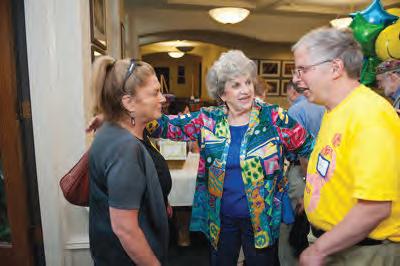
the arts lives on.”
Schreiber hopes Hirsch-Brody’s former students and friends will celebrate her life on Sept. 25 at 11 a.m. in the JCC’s Robinson Building.
said. “We hope to continue to grow and build that fund over time, because our work with disabilities has grown exponentially.”
In an announcement regarding the Sept. 25 celebration, the Associated Artists of Pittsburgh mentioned the Zola Hirsch Special Needs Fund.
“Lila wasn’t just an ordinary teacher. She was more than that,” Kranich said. “She was that type of person that led the artistic community.”
The Pittsburgh Society of Artists Guild commemorated Hirsch-Brody, its longtime member, on Instagram: “We are saddened by her passing on July 9, 2024 but her passion for

“She had an incredibly long tenured career at the JCC, because she gave unconditionally to her students and her students gave back to her,” he said. “For those students that loved and cared for her so deeply to gather in a place that they care about so deeply, it’s important to be able to say goodbye and celebrate her many contributions. She was a joyous, happy, vivacious, full of life individual, and that life deserves to be celebrated in a place where she created so much celebration.”
PJC
Adam Reinherz can be reached at areinherz@pittsburghjewishchronicle.org.


Join us for a presentation & conversation from Rabbi Hanan Schlesinger and Noor A’wad about the groundbreaking work of Roots/Shorashim/Judur - an IsraeliPalestinian grassroots initiative for understanding, nonviolence and transformation based in Israel & the West Bank.


SATURDAY, SEPTEMBER 21, 2024 1:00 PM - 3:00 PM CONGREGATION BETH SHALOM 5915 BEACON STREET, PITTSBURGH, PA 15217 Roots envisions a social and political reality that is founded on dignity, trust, and a mutual recognition and respect for both peoples' historic belonging to the entire Land.


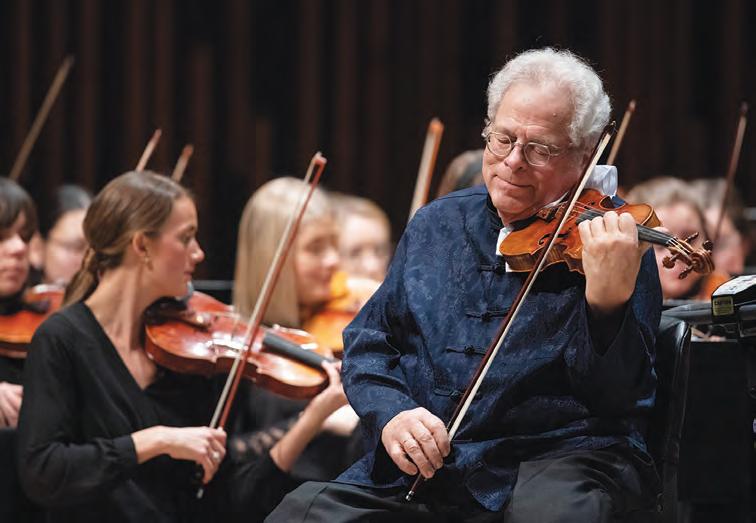
times, music is a great escape,” the acclaimed violinist said.
By Adam Reinherz | Senior Staff Writer
Music conjures memories. Itzhak Perlman hopes listeners forget.
“When you are in very bad



Speaking by phone from Long Island a few days before his Sept. 21 performance with the Pittsburgh Symphony Orchestra, Perlman recalled visiting western Pennsylvania in 2018.
One month after the Pittsburgh synagogue


“Be the change you want to see in the World.”








shooting, the Israeli American played in memory of the 11 Jews murdered and in honor of Pittsburgh’s first responders.
“That was not a happy occasion, but it still was something that was very important to do,” he said.
Six years have passed since that Pittsburgh performance. Antisemitism has increased. Community fabric feels more fragile. In some ways, the impetus behind that 2018 show is even greater, he explained.
“Music is an international language, and it’s always a barometer as to what goes on in the world,” Perlman said. At the same time, attending a concert and minding the melody offers reprieve, the virtuoso said. “Music does not have enemies or friends or anything. It’s just a soothing kind of experience.”
Perlman, 79, has had a bird’s-eye view of modern Jewish history. Born in prestate Israel months after the end of World War II, Perlman was raised in Tel Aviv by Polish parents. He trained at the Academy of Music in Tel Aviv before coming to New York thanks to an America-Israel Cultural Foundation scholarship. A 1958 performance on the “Ed Sullivan Show” gave the then-teen an early introduction to stardom. After studying at the Juilliard School and winning the Leventritt Competition in 1964, Perlman joined countless major orchestras worldwide.
He recalled times with the Israel Philharmonic, “where we would go to places where countries would not have relationships with Israel. And then when the diplomatic relationship warmed up, the first sign would be the exchanging of art, artistic organizations, such as orchestras and so on.”
Long revered by musicians, celebrities and fans, Perlman has received 16 Grammy Awards, four Emmy Awards, a Kennedy Center Honor, a Grammy Lifetime Achievement Award and a Genesis Prize. Other accolades include a Presidential Medal of Freedom from
Arts from former President Bill Clinton and a Medal of Liberty from former President Ronald Reagan.
Perlman has spent decades on the world’s largest stages. But a lifetime of playing doesn’t mean he wasn’t listening all the while.
This moment in history “is not good,” he told the Chronicle. “I’m not an expert as to what can be done about it, but it’s not good from so many points of view.”
When pressed to explain, Perlman said he’s a musician “not a statesperson” and that he hopes “things will improve.”
His Pittsburgh visit falls less than two weeks before Rosh Hashanah. With the Jewish new year rapidly approaching, Perlman said “peace” is on his mind.
“We got to have peace,” he said. “We have to solve all these problems. I don’t want to talk about it, but all I can say is that it’s so upsetting that I just can’t even think. It’s very upsetting.”
Despite the difficulty, Perlman remains positive.
“I’ve always had to be optimistic,” he said. “I’m just hoping for some sort of miracles.”
In the artist’s mind, this moment calls for music. So, like he’s done for decades, Perlman will continue playing.
“I’m looking forward to going on stage and sharing my music with whoever wants to hear it,” he said.
He knows that audiences in Pittsburgh and around the world find comfort and inspiration from his performances. He also knows that aging has offered perspective.
When asked what wisdom he’s gleaned in nearly 80 years of life, Perlman replied, “There’s nothing more valuable than experience. But experience goes with getting old.” PJC
Adam Reinherz can be reached at areinherz@pittsburghjewishchronicle.org.
Join us in making care kits to give to people in need of kindness 3 opportunities to get involved: donate • pack • deliver
30
GIFT CARDS from Giant Eagle, Target or Aldi in any amount help us purchase items. Please drop off gift cards at JCC Squirrel Hill CenterFit Desk or JCC South Hills Front Desk.
SHOP and deliver items to JCC. All items must be new and unopened.
Health and Hygiene Items
Travel Packet of Tissues
Pens
Pocket-sized Notepads
Travel Packet of Band-Aids
Regular Box of Band-Aids
Cough Drops
Floss
Toothpaste
Toothbrush
Travel-sized Shampoo
Travel-sized Soap
Body Wipes
Individual Hand Wipes
Food Items
Peanut Butter individually packaged Fruit Cups
Snack Crackers individually packaged Juice Boxes
Granola Bars – soft and individually packaged
SHOP OUR AMAZON WISHLIST and have items delivered to the JCC.
JCC Squirrel Hill Levinson Hall Thursday, October 3 • 3–4:15 pm Enter on Darlington
PACK Care kits with us this Rosh Hashanah DELIVER Care Kits to our community partners
Deliver care kits to our community partners serving Pittsburghers experiencing housing and food insecurity. More details will follow once you register.
Register to PACK or DELIVER here
JCC South Hills Social Hall Sunday, October 6 • 2–3:15 pm All ages events For more information: Rabbi Hindy Finman hfinman@jccpgh.org



Rosie Marcus — the daughter of Lisa and Jonathan Marcus, younger sister of Leo Marcus, and granddaughter of Marsha and Bernard Marcus, and Susie and Daniel Zeidner — was called to the Torah as a bat mitzvah on Sept.14, 2024. Now in seventh grade, Rosie has attended Community Day School since prekindergarten. She enjoys playing sports, hanging out at the pool or lake, cuddling with her dog (Winnie), and quietly excelling in school.

Rebecca and Alex Rudel are thrilled to share the birth of their daughter, Goldie Raye Rudel, born on July 12, 2024, in Pittsburgh. Goldie is named after her maternal great-grandmother, Doris (Goldstein) Robinson, and her paternal great-great-grandmother Ruth (Gold) Markowitz. Her kvelling grandparents are Rochelle Sufrin, David Sufrin and Diane Samuels, and Debra and Barry Rudel, all of Pittsburgh. Goldie’s great-grandparents are Judy (Markowitz) and Marvin Levick, the late Doris (Goldstein) and Leonard Robinson, Marianne (Halle) and Adolph Sufrin, all of Pittsburgh, and Charlotte (Harris) and David Rudel of Johnstown. PJC


“Hashem will confirm you for Himself as a holy people, as He swore to you, if you observe the commandments of Hashem and go in His ways. Then all the peoples of the earth will see that the Name of Hashem is proclaimed over you and they will fear you.”
(28:9-10)
The Targum (Yonasan/Yerushalmi) and Talmud (Brochos 6a, Menachos 35b) take this as a reference to tefillin on the head. In context (see verse 7-8), this refers to the battlefield. Can soldiers wear tefillin on the battlefield while facing off with the enemy? Tefillin require concentration. The battle is an obvious distraction. Perhaps those back home wear the tefillin, but how does this scare the enemy? Perhaps it will scare them when they enter the city!
The larger question is: Why is this power of tefillin only available at a time of blessings? What if people are not observing the mitzvos, but are wearing tefillin? Does it not engender fear when an enemy sees the Name of Hashem embossed on them? Furthermore, we have a tradition that people made great sacrifices to wear tefillin in times when they were banned by the enemy authorities — and we have records of how they helped. And what about women and children who don’t wear tefillin? Perhaps, as long as the adult men wear them, the effect is felt.
upon them. That is, Hashem will put His Name on Israel.
How do peoples see this? When Israel demonstrates that they value the fact that Hashem’s Name is upon them, and they want to distinguish themselves from the other nations, Israel shows that they want to be different and special. Initially, the nations will mock them. Eventually, they will see that Israel wants to be distinct in their religion and conduct. The tefillin of the head highlights this. One who puts them on without thinking does not necessarily feel the Name of Hashem on his head. One who thinks and concentrates certainly feels it. This very intent and feeling makes an impression on the peoples. They see someone really serious about his tefillin, who is emotional about it. They sense that he recognizes Hashem’s Name on his head, and they are afraid to approach Israel to harm them.





To accomplish this, one need not wear tefillin shel rosh . Dressing modestly and separating oneself from the immodesty of the fashions also shows that one wishes to stand out due to Hashem’s Name. When Israel does the will of Hashem, observing His mitzvos, they are evidently wearing tefillin with the right thoughts. The nations recognize this, and it leaves a strong impression on the peoples. If Israel is not busy performing Hashem’s will, even if they wear tefillin, in their minds it is not so special. They wish they could assimilate with the peoples of the earth. Then, it will not have any effect. Rather, it is an insult to the Name of Hashem. The wearer might feel uncomfortable standing out.
Rabbi Shimon Silver is the spiritual leader of Young Israel of Greater Pittsburgh. This column is a service of the Vaad Harabonim of Greater Pittsburgh. 5885 Forbes Avenue • Squirrel Hill, PA 15217
Professional nurse’s aid, cook, etc… to care for your loved one.
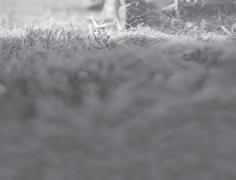









25 years of experience. Over night, Tues., Wed., Fri. 15-20 hours/week.
Ask for Curtis: 412-277-6737 HOME CARE

Chasam Sofer interprets this verse to refer to the way Israel distinguishes itself, specifically in its modest clothing, language and naming. By holding the moral high ground, Israel demonstrates allegiance to Hashem and His Name. This causes the enemy to fear Israel, because it is quickly apparent that they are on the side of Hashem.
When Israel listens to and observes the mitzvos, Hashem confirms them as His people … and the peoples of the world see that Hashem’s Name is proclaimed
In our times, we all know how we stand out, very often by the outer trappings that proclaim to the world: “I am proud to be different, and to carry the Name of Hashem!” Let us hope and pray that Hashem will confirm us as His people and protect us! PJC

GROSS: On Aug. 27, 2024, Beulah (Bea) Meltzer Gross of Laguna Woods, California, formerly of Pittsburgh, passed away peacefully in the home of her daughter Barbara Gross Mutchnick. She was predeceased by her husband, Alvin Gross. She was the devoted mother of Barbara Mutchnick (Robert), Donald Gross (Susan) and Maxine Christenson (late Donald). She was a most loving grandmother to Suzanne, Andrea, Juli, Michael and Katie and adored her seven great-grandchildren: Bea, Ben, Adeleine, Asher, Dawn, Claire and Dylan. She was always fun-loving, optimistic and extremely devoted to her family.
TOPOL: Frances Topol, on Sept. 16, 2024. Loving daughter of the late Harry and Anna Topol. Cherished sister of Ruth Barnett of Palo Alto, California, and Mitch (Barbara) Topol of Mountain View, California. Aunt of David (Andi) Barnett and their children, Jonah and Hannah; Steven (Maria) Barnett and their children, Jake and Owen; Aaron Topol; and Michael Topol. Services were held at Ralph Schugar Chapel, Inc. Interment Adath Jeshurun Cemetery. Contributions may be made to Merakey (merakey.org/donate). schugar.com PJC
and physician
whose distinctive work adorned museums, synagogues and opinion pages, dies at 79


Contact the Development department at 412-586-2690 or development@jaapgh.org for more information. THIS WEEK’S YAHRZEITS —
Sunday September 22: Minnie E. Aberman, Emanuel Hyman Bennett, Isadore Brown, Ted Brown, Norma Cohen Dobrushin, Marilyn B. Neuwirth Herron, Julia Kitman, Fannie Liebman, Lillian E. Friedman Pachtman, Sadie Rebecca Ruttenberg, Benjamin C. Simon, Meir A. Weiner, Meyer Wolk, Irving S. Zamore
Monday September 23: Sam Carson, Elizabeth Marine Chaiken, Esther F. Cohen, Sadie Friedland, Leonard H. Goldberg, Samuel Henry Harris, Ella Herman, Henry H. Katz, Anna C. Kenner, Samuel G. Osgood, Benjamin L. Schulman M.D. , Yetta B. Sirota, Ruth Soffer, Bennie Star, Lawrence Swartz, Harry H. Wyner, Oliver Zimmer

By Andrew Silow-Carroll | JTA
Admirers of artist Mark Podwal’s work tended to describe the visual puns, metaphors and transformations that were his signature.
“A city grows out of an open book.” “A child’s noisemaker can become a gallows for the wicked.”
“A Jewish runner — identified by an Israeli flag emblem on his or her bib — passes not through finish-line tape, but an arch with columns and floral designs, typical of title-pages of Jewish books.”
In illustrations like these — created for children’s books, major newspapers, synagogue tapestries and gallery walls — Podwal devised a Jewish visual vocabulary that made him one of the best known Jewish artists of his era. He also became the only working dermatologist whose works on paper are included in the Metropolitan Museum of Art’s Modern and Contemporary Art Collection.
The novelist Cynthia Ozick once compared him to a Hasidic master, writing that he “can fire magic into visual being, and can actually reverse nature and society.”
Podwal, who lived in New York, died Friday. He was 79.
Ozick’s praise was included in the 2016 book “Reimagined: 45 Years of Jewish Art,” a retrospective of his work that included a foreword by his friend Elie Wiesel. Podwal illustrated an edition of Wiesel’s “Jews of Silence,” a book about Soviet Jews, and in 1983 collaborated with Wiesel on “The Golem,” a version of the folktale set in medieval Prague, a city for which the artist had a particular affinity. Podwal accompanied Wiesel to Oslo when the Holocaust survivor accepted the Nobel Peace Prize in 1986.
The New York Times frequently commissioned his illustrations, including a portfolio, appearing a week after the terror attacks of 9/11, depicting homes, businesses and offices flying the American flag.
Please see Podwal, page 20
Tuesday September 24: Isadore Ackerman, Sadye G. Adler, Anna Amdur, Milton Saul Baseman, Isadore Cohen, Arnold Deutelbaum, Harold Glick, Joseph Klein, Sylvia Lebenson, William Leibovitz, Isadore Liberman, Pearl Love, Lena Mandelblatt, Lena Morantz, Bessie Wilkoff Osgood, Dora Podolney Krasik, Alick Portnoy, Sarah Rosen, Albert Ross, Morris Schachter, Elsie Skigen, Anne Skirboll, Hyman Stearns, Louis Herman Weiss
Wednesday September 25: William Beck, Joseph Cohen, Helen Rosen Cowen, Rebecca Eger, Peter Glick, Rose Goldenson, Lucile F. Hanauer, Fannie Zweig Lando, Leonora Lichtenstul, Lila P. Margolis, Lillian Goldman Mason, Sam Perilman, Maurice Perr, Bessie Geber Rosenfield, Allan Schwartz, Morris Sigman, Jacob Silberman, Bennie Turk, Max Turk, Sally Weintraub Eichner
Thursday September 26: Julius Altshuler, William V. Conn M.D., Adelyne Crumb, Julius Davis, June Y. Enelow, Fay Ruth Frank, Rebecca Green, Stanley Hohenstein, Charles M. Horovitz, Sarah Basia Horwitz, Max I. Levinson, Mary Ethel Miller, Mark J. Mundel, Charles S. Perlman, Adolf Siegel, Norman Sife, Sarah B. Simon, Herman Wolfe
Friday September 27: Bess Abrams, Hanna Balkman, Abraham Bennett, Sara Cukerbaum, Israel Feldman, Eva S. Friedman, Max Garfinkel, Selma Halle, Sadie Jacobs, Helen Markowitz, Theodore Miller, Jane Moravitz, Lt. Albert Rosenfeld, Albert Sleisenger
Saturday September 28: Leo Morris Americus, Rose Berger, Nathan Drucker, Emma Faigen, Isaac Horn, Paul Kaufman, Emil Joseph Klein, Sarah Levenson, Joseph Mirow, Benjamin Newberg, Abraham Ohringer, Samuel Patkin, Leonard B. Rosen, David B. Saltsburg, Maurice Stern, Lawrence Norman Tunkle, Gertrude Wanetick, Edmund Wechsler, Ben Weiner

(1.) Publication Title: Pittsburgh Jewish Chronicle.
(2.) Publication Number: 582-740.
(3.) Filing Date: 9/18/2024.
(4.) Issue Frequency: Weekly.
(5.) Number of Issues Published Annually: 52.
(6.) Annual Subscription Price: $60.00.
(7.) Complete Mailing Address of Known Office of Publication and of
(8.) General Business Office of Publisher: Pittsburgh Jewish Chronicle, 5915 Beacon Street, 5th Floor, Pittsburgh, PA 15217-2005.
(9.) Publisher: Pittsburgh Jewish Publication and Education Foundation, 5915 Beacon Street, 5th Floor, Pittsburgh, PA 15217-2005. Editor: Toby Tabachnick 5915 Beacon St, 5th Floor, Pittsburgh, PA 15217-2005.
(10.) Owners: Pittsburgh Jewish Publication and Education Foundation, 5915 Beacon Street, 5th Floor, Pittsburgh, PA 15217-2005.
















(11.) Known Bondholders, Mortgagees, and Other Security Holders Owning or Holding 1 Percent or More of Total Amount of Bonds, Mortgages, or Other Securities: None.








(12.) Tax Status: Has not changed during preceding 12 Months.



(13.) Publication Title: Pittsburgh Jewish Chronicle.
(14.) Issue Date for Circulation Data Below: 9/13/2024.
(15.) Extent and Nature of Circulation: Average No. Copies Each Issue During Preceding 12 Months; No. Copies of Single Issue Published Nearest to Filing Date.
Podwal:
Continued from page 19
Nevertheless, he invariably returned to Jewish themes. Last year, the Museum at Eldridge Street, in a renovated 19th-century synagogue on the Lower East Side, featured Jewish woodcuts from the 16th century that Podwal had “revised” with contemporary references.
“Museum directors and curators have urged me to broaden my subject matter — to become an artist more universal rather than being limited by Jewish content, but my heart is with the Jewish experience,” Podwal told the New York Public Library last year.
Other Jewish work included his illustrations for a Haggadah and a Reform prayer book for
young people, and textiles he designed for the Altneuschul in Prague and the Brno synagogue in the Czech Republic. In 2016, the Museum at Eldridge Street featured an exhibit of his works based on the Polish shtetl where his mother was born and raised, and this year installed a mosaic floor featuring his interpretation of the Hebrew zodiac.
He also designed the stage backdrop for a 1981 Simon and Garfunkel concert in Israel.
Throughout his career as an artist, which drew praise from figures as diverse and well-known as Mel Brooks and the historian David McCullough, Podwal continued to serve on the faculty at NYU’s Grossman School of Medicine, where he taught dermatology.
Podwal was born June 8, 1945, and was
raised in the Fresh Meadows neighborhood of Queens, New York. His father, a bar owner, encouraged him to pursue a medical career. His mother, Dorothy, came to America in 1929 with her parents at the age of 8, and often spoke of her brother, David, who was unable to emigrate at the time and was later killed in Treblinka. Her mother suffered a breakdown upon hearing the news, and spent the last 18 years of her life in a psychiatric hospital in Queens.
“I’ve been told that my Uncle David drew very well,” Podwal told the New York Jewish Week in 2016. “I’d like to believe that my talent in art is a gift to his memory.”
He first began drawing seriously as a medical student at NYU, and his work was exhibited at
the medical school’s main hall and appeared on covers of the Journal of the American Medical Association. Political drawings that he completed in his fourth year of medical school were published in his first book, “The Decline and Fall of the American Empire,” published in 1971, and were exhibited at a Madison Avenue art gallery. He pursued dermatology as a specialty rather than the more consuming surgical track so he would be able to devote more time to his art.
In the Jewish Week interview Podwal described himself as a “non-observant Orthodox Jew.”
“My drawing is my way of participating in Judaism,” he said. “It’s a form of prayer.”
Podwal’s survivors include his wife Ayalah, and sons Michael and Ariel. PJC
This is one in a series of articles about Elder Law by
Michael H. Marks is an elder law attorney with offices in Squirrel Hill. Send questions to michael@marks-law.com or visit www.marks-law.com.
We all plan constantly, every day. We make plans both big and small. But planning for the future is an imperfect exercise. We can’t anticipate everything that might happen, and mistakes happen.
But sometimes even the brightest and most capable among us simply neglect to safeguard ourselves, our families and our wealth in the event of our disability or death.
Here are some essential steps to take for personal legal planning. (This is not an exhaustive list.)
Don’t wait or procrastinate. Sooner is better than later. Unless you can predict with certainty the moment of your future disability or death, be prepared before you need legal planning. We carry a spare tire in our cars in case we get a flat tire. Get professional help and avoid doing it yourself. An estate planning attorney will raise issues and ask questions that you might not think of. What’s at stake is everything you’ve ever worked and saved for, and the family you love. Don’t be penny wise and pound foolish. Do it right.
Choose your fiduciaries (helpers) carefully. A fiduciary is someone who serves legally for the benefit of another, such as an Executor, Trustee or Guardian. The best choice is not always the oldest child or the child who lives closest.
Plan for contingencies and choose successors
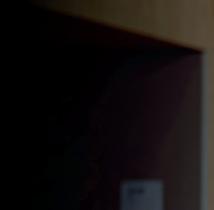

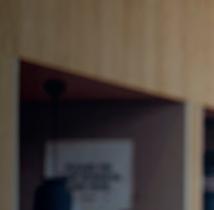

to help you when the first choice is not available. Who will inherit someone’s share if they die before you and are not alive to inherit themselves? Who will serve as the backup or substitute Executor or Trustee? You can also almost always name two people to serve together, when two heads are better than one (but not if they don’t get along!).
Make Powers of Attorney in case you need help during your lifetime. Your Will only comes into effect after you die to say who will wind up your affairs, and how. Powers of Attorney are just as important because before somebody becomes deceased, they may become disabled. In your Powers of Attorney you can specify who you choose to help you, and how, if you become unable and need assistance during your lifetime. Otherwise your family might need to litigate a guardianship case in court, and someone may end up in charge of you who you really didn’t want.
Pay careful attention to designating beneficiaries on qualified retirement accounts such as IRAs. There are opportunities to get extra beneficial after-tax results, but making a mistake means that the beneficiaries of an inherited IRA may pay more tax than they need to, reducing its value.
Create Special Needs Trusts for anyone, young or old, with a disability or who may need to rely on public benefits such as Medicaid. If you leave an inheritance outright to someone with a disability, or a senior in a nursing home on Medicaid, your bequest won’t necessarily add value for them. A Special Needs Trust lets you have your cake and eat it too: your beneficiaries retain eligibility for basic benefits, AND the inheritance from you adds supplemental value
to improve their lives.
Communicate now, during your lifetime, with your family and successors and those who are important to you, or who will make decisions for you. Tell the people who love you what you want now, while you can, in addition to writing it down and signing it for later. Late night conversations around the kitchen table really help to let others know what you want and don’t want.
But also: put in writing, put in writing, put it in writing. All of estate planning, Wills, Powers of Attorney, trusts, etc., is about you making your choices, writing it down and signing it to make it stick later. It’s not hard to do with the right help.
Gather and organize information that others can use to help you in an emergency.
Financial records, funeral arrangements, lists of contacts to call, where to find your estate planning documents, car titles, IOUs, etc. will

assist those whom you will ask to help you when needed.
After someone has died, protect the dependents – children, pets, even plants –and secure the house.
Even when probate is not necessary, remember to file and pay Pennsylvania Inheritance Tax. Though you may not need to probate a Will or be officially appointed as an Executor or Administrator, almost everyone in Pennsylvania owes Inheritance Tax on what they left behind, even when it all goes to joint owners or beneficiaries. Generally only bequests to a surviving spouse or a charity, and life insurance death benefit proceeds, avoid inheritance tax completely.
At Marks Elder Law, we help people every day with issues like these. I invite your questions and feedback. Please let me know how I can help you and your family.







Contact me today to discuss all of your real estate needs!
Sherri Mayer, Realtor Squirrel Hill Office C: 412-760-0412 O: 412-421-9121x225 sherrimayer@howardhanna.com HowardHanna.com




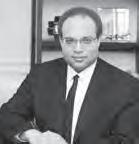





Smith-Rosenthal Team Jason A. Smith & Caryn Rosenthal
Jason: 412-969-2930 | Caryn: 412-389-1695 Jasonasmith@howardhanna.com Carynrosenthal@howardhanna.com





















—
By Rachel Ringler | JTA
Alot has changed since the last time Michael Solomonov released a cookbook, back in 2018. The celebrity chef, who grew up in Pittsburgh, has opened several new restaurants. He has expanded his empire beyond Philadelphia to New York City. And of course he has watched his native Israel, the flavors of which have defined his career, come under attack.
After Solomonov raised money for emergency services in Israel following Hamas’ Oct. 7 invasion, pro-Palestinian protesters in Philadelphia took aim at him. They staged a protest outside Goldie, his kosher falafel joint, accusing it of “genocide,” and called for a boycott of his restaurants, some of which have Hebrew names.
What the protesters haven’t done, Solomonov and his longtime collaborator Steven Cook said this week, is dampen appetites for their food.
“Since Oct. 7, we are busier than ever,” Cook said during a launch event in New York City this week for the duo’s third book, “Zahav Home,” named for their first, and highly acclaimed, restaurant.
“We all know how challenging it is out there right now,” Cook said. “Fortunately, for us it is a lot of noise. Our customers have doubled down in their support for us.”

Cook’s comments came during an appearance with Solomonov at the Streicker Center at Temple Emanu-El on Manhattan’s Upper East Side on Tuesday, the day that “Zahav Home” hit shelves. Their tour will take them on a circuit of Jewish communal venues across the United States — marking a slight departure from their last launch, when in addition to a range of Jewish and non-Jewish venues, the pair also had a series of appearances at Williams Sonoma stores. At a time when some Jewish creatives and personalities have openly questioned whether they are welcome in non-Jewish spaces, Cook said he and Solomonov have a different reason for sticking to a Jewish circuit.

A Reconstructionist Congregation
• Rolling Admission for 2024-25 School Year Apply Now
• Kindergarten thru 7th Grade
DorHadashReligiousSchool AReconstructionistCongregation
● RollingAdmissionfor2024-25SchoolYear-ApplyNow
● Kindergartenthru7thGrade ● WeeklyClassonWednesdaysat4:30PM ClassesheldatRodefShalominOakland DorHadashincludesandfullyembracesmultifaith,multiracial,and LGBTQIA+individualsandfamilies.
• Weekly Class on Wednesdays at 4:30PM
Formoreinformationortoenrollcontact:
• Classes held at Rodef Shalom in Oakland
KarenMorris,EducationDirectoratprincipal@dorhadash.net www.dorhadash.net/religious-school/about-the-school includewebsiteonad)
• Dor Hadash includes and fully embraces multifaith, multiracial, and LGBTQIA+ individuals and families.
For more information or to enroll contact:
Karen Morris, Education Director at principal@dorhadash.net
LINKtoLogo (vertical) LINKtologo (horizontal)

www.dorhadash.net/religious-school/about-the-school
“It is a built-in audience for what we do,” Cook told the Jewish Telegraphic Agency. “Jewish communities have been incredibly supportive of all of our books, and we got enthusiastic responses when we started making inquiries.”
Solomonov and Cook will be in Pittsburgh, at Congregation Beth Shalom, on Nov. 20, as part of the Pittsburgh Jewish Book Festival.
Neither Cook nor Solomonov had planned to write a third cookbook after releasing “Zahav” in 2015 and “Israeli Soul” in 2018. But then came the pandemic.
“On March 16, 2020, everything stopped,” the partners write in the introduction to their book.
“In a matter of a few hours, we went from more than four hundred employees to zero employees.”
The two men, who had then been business partners for 16 years, lived a block apart at the time.
“At the time that lockdown happened, we had been going to Zahav every single day for 13 years,” Cook said. “All of a sudden we couldn’t go there anymore. Our days were spent doing laps around this park. We thought our businesses would wither away, so in an effort not to be so depressed, the conversation turned to, ‘What did you cook for dinner last night?’ or the lunch I made for my family every day.”
Solomonov said, “Being able to cook for our families and then to have things to discuss and a creative outlet was cathartic.”
The partners realized they had a theme for a book, which they started in 2021 and completed the following year.
“We decided that since we were going to focus on home cooking, we would shoot in an actual home kitchen,” Cook said. “Mike lost the coin toss and everything was shot in his house. Everything in the book was cooked start to finish from scratch. Nobody was handing us pre-prepped ingredients. The recipes were improvised along the way.”
The book is made up of 125 recipes, all of which have Israeli and/or Jewish roots. So there is Eastern European matzo ball soup and Moroccan harira; Shira’s potato kugel flavored with parsley and dill; and phyllo bourekas stuffed with Swiss chard and feta.
Many of the recipes in “Zahav Home” appeared in their other books but have been streamlined for the home cook. Their chraime, for example, a North African fish stew typically eaten on Shabbat, was prepared with a whole fish in “Zahav.” In “Zahav Home,” the recipe calls
for boneless fish filets.
“We grew up a little,” said Solomonov. “The ‘Zahav’ recipe is more fussy. I like to think that over the years we have changed and this is more realistic for the home cook. We are cooking for our families, on weeknights, with a time crunch which forces you to take different directions for the same recipe.”
The book starts with photos and descriptions of some of the condiments and spices that you would need to have on hand to cook some of the food in the book, such as baharat, a sweet and savory spice blend; pomegranate molasses; the fermented mango condiment amba; and smoked cinnamon, which they use in their lentil soup and kebabs.
Solomonov and Cook have been using these ingredients for years. But another thing that’s changed since they opened Zahav 16 years ago — and maybe in part because of their influence — is that those ingredients have become relatively easy to obtain.
“People are more familiar with the pantry ingredients that are fundamental to the food that we cook,” said Cook. “Certainly you can find a jar of harissa in any supermarket in America. And the quality and availability of tahini and everything else have improved.”
Although Cook says you don’t have to be Jewish to use the book — and their restaurants have a following that goes beyond Jewish diners — the authors do assume some familiarity with Jewish culture. They describe, for example, their Spatchcock Chicken recipe with Hungarian Seasoning as being perfect for Shabbat.
“I feel like ‘Shabbat’ is in the New York Times crossword puzzle so it’s fair game,” said Cook. Harder to detect might be the fact that almost all of the recipes in the book would be accessible for cooks who keep kosher. The book does not advertise itself as comporting with traditional Jewish dietary laws, but none of the recipes call for non-kosher ingredients, including shellfish or non-kosher meats, and only one mixes meat with milk, a forbidden combination under the laws of kosher eating.
“That is our guiding idea at Zahav,” said Cook. “It is not a kosher restaurant but we never serve traif, and we never mix meat and milk. But we couldn’t resist [including a recipe for] those meatballs mixed with parmesan cheese. We left that in there as a little Easter egg for people to find.”
The philosophy has extended far beyond Zahav. The pair’s other restaurants — Laser Wolf, Dizengoff and K’far — do not serve pork or shellfish. (They do serve non-kosher meat and, unlike Goldie, do not carry kosher certification.) This fall, they’re opening Aviv, a cross between Zahav and Laser Wolf in Miami, complete with a charcoal grill and fresh Yemeni flatbread.
Also on the docket for this fall: a new restaurant called Jaffa Bar in Philadelphia.
“It will break our kosher streak,” said Cook. “It is a seafood bar.”
But while the food is the main point of their joint business, CookNSolo, in the post-Oct. 7 world they see their latest book as being about more.
“We are seeking ways to either connect to the community or find joy in challenging times,” Solomonov said, “and we are hoping that this book will provide a little bit of that.” PJC
Bring them home
Community members gathered on the corner of Darlington Road and Murray Avenue in Squirrel Hill to demand release of an estimated 101 hostages. The Sept. 15 demonstration marked 345 days since captives were taken into Gaza.

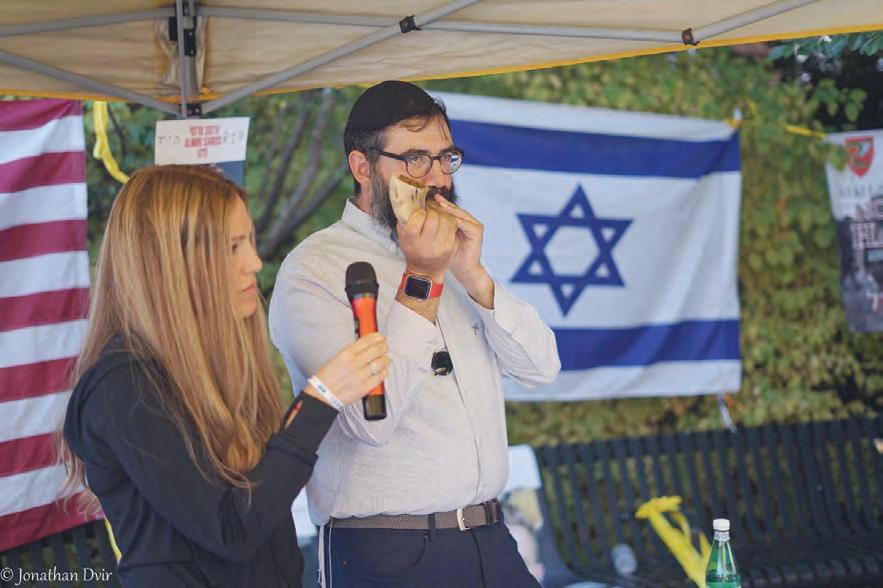

Time to fly



